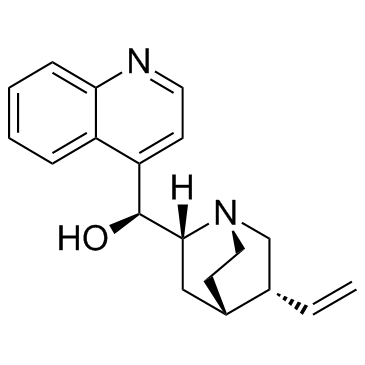Microbiology & Virology
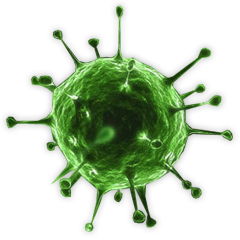
Microbiology & Virology
A virus is a small infectious agent that replicates inside living cells. Viruses cause many human diseases from small illnesses, like influenza, to more deadly diseases, like hepatitis B and HIV. Our body’s immune system defends against viral infection by generating specific antibodies to bind to and neutralize viral particles and by cell mediated immunity that destroys infected host cells.
Targets for Microbiology & Virology
- Antibiotic(607)
- Bacterial lipoprotein targeting chaperone(0)
- CCR5(2)
- CMV(23)
- gp120/CD4(4)
- HBV(76)
- HCV(138)
- HIV(438)
- HSV(97)
- Influenza virus(133)
- NA(7)
- Reverse Transcriptase(68)
- RSV(39)
- SRPK(5)
- SARS-CoV(155)
- Antifungal(52)
- Orthopoxvirus(3)
- Antimalaria(6)
- Beta-Lactamase(0)
- VEEV(1)
- Arenavirus(9)
- Bacterial(1318)
- Enterovirus(24)
- Filovirus(13)
- Fungal(353)
- Parasite(395)
- Virus Protease(66)
- Chicken Pox & Shingles(2)
- Chikungunya(1)
- Coronaviruses(35)
- Dengue(5)
- DNA & RNA Polymerase Inhibitors(11)
- Ebola(0)
- Entry/Fusion Inhibitors(10)
- Epstein-Barr(2)
- Integrase Inhibitors(5)
- MERS(10)
- Others(0)
- Rhinoviruses(2)
- West Nile Virus(1)
- Yellow Fever(3)
- Zika(3)
- COVID-19(41)
- Antiviral(2)
Products for Microbiology & Virology
- Cat.No. Product Name Information
-
GC39580
Ceftezole sodium
Ceftezole sodium (CTZ sodium) is a broad-spectrum cephem antibiotic against many species of gram-positive and gram-negative bacteria.

-
GC15695
Ceftibuten
third-generation cephalosporin antibiotic
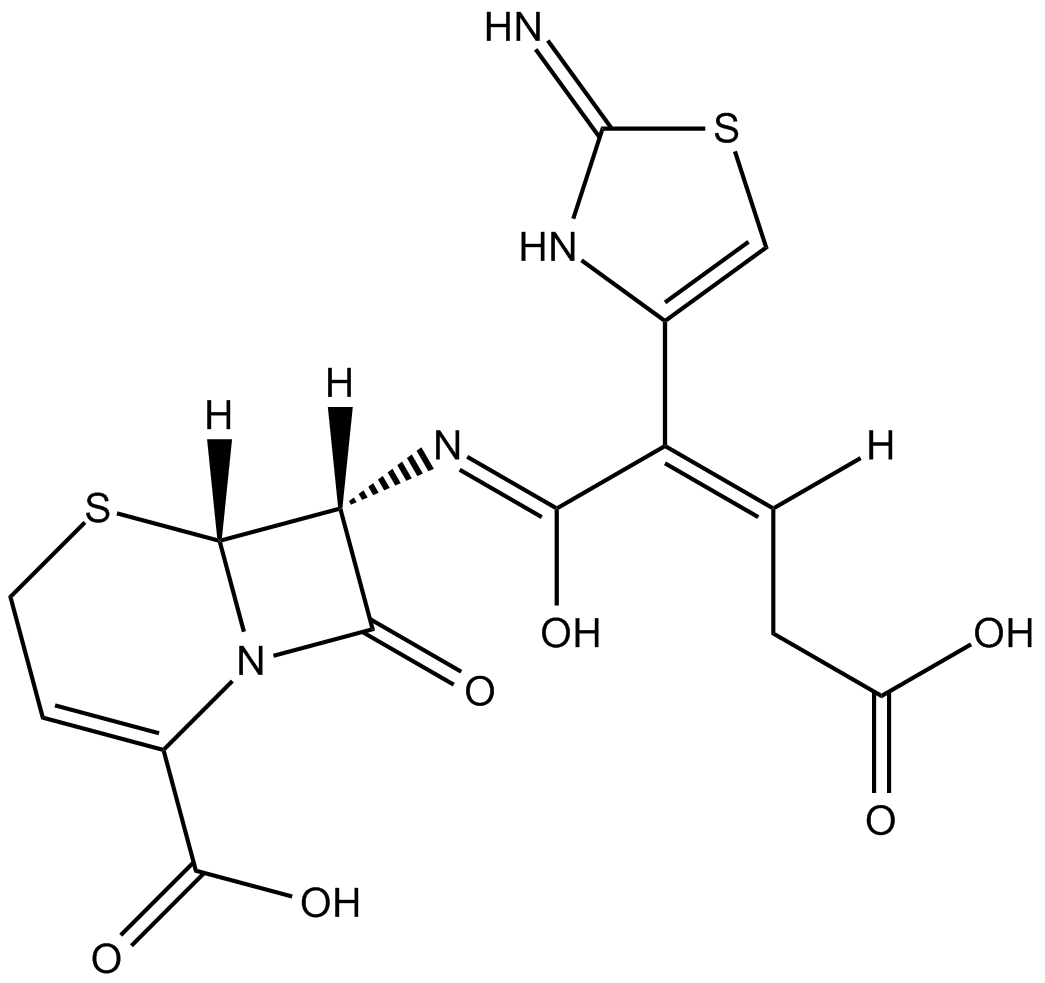
-
GC35647
Ceftibuten dihydrate
SCH 39720
Ceftibuten (Sch-39720) dihydrate, an antibiotic, is an orally active cephalosporin, possesses potent activity in vitro against a wide range of gram-negative and certain gram-positive pathogens.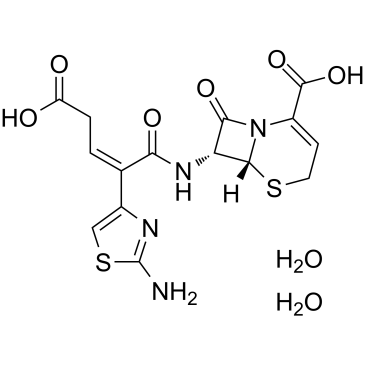
-
GC11235
Ceftiofur HCl
U-64279A, U-67279A
Ceftiofur HCl is a semisynthetic antibiotic, with activity against various gram-positive and gram-negative, aerobic and anaerobic bacteria encountered by domestic animals.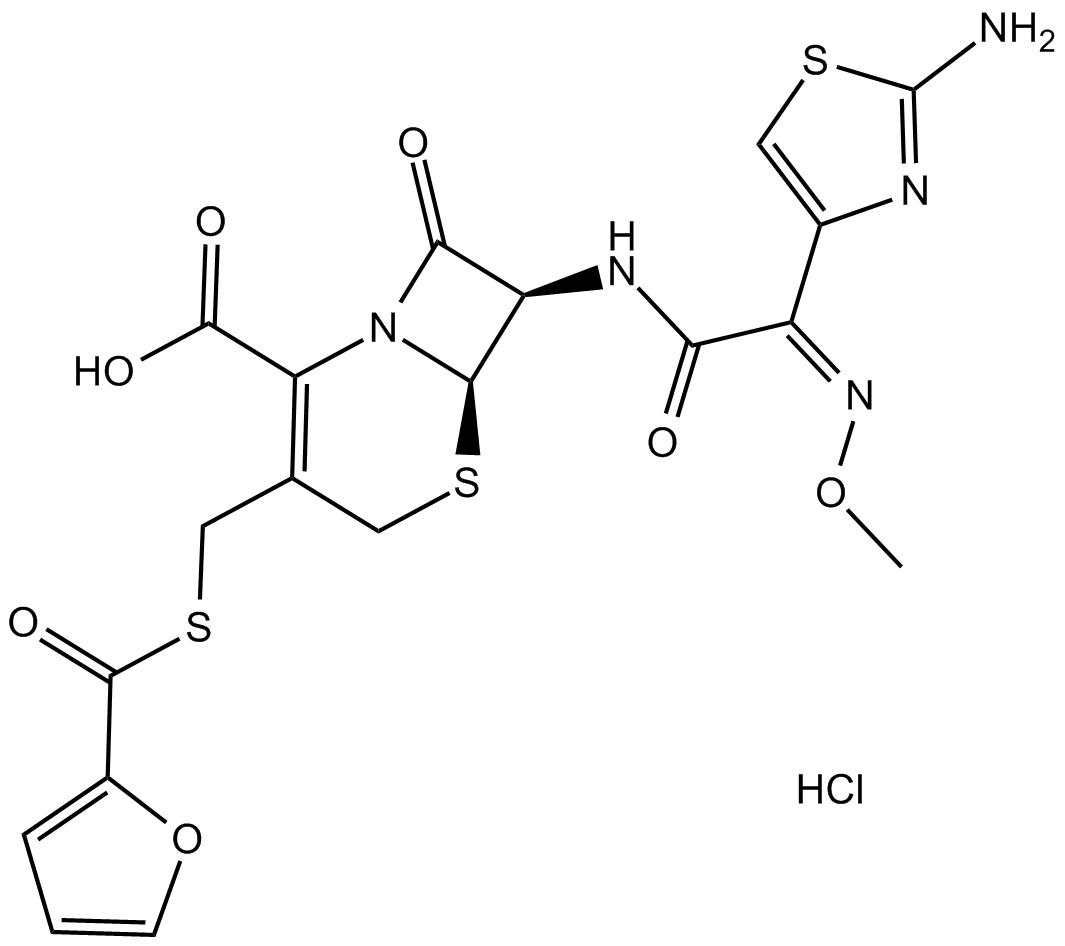
-
GC32159
Ceftiofur sodium (sodium ceftiofur)
Ceftiofur sodium (sodium ceftiofur) is an antibiotic of the cephalosporin type (third generation), licensed for use in veterinary medicine.
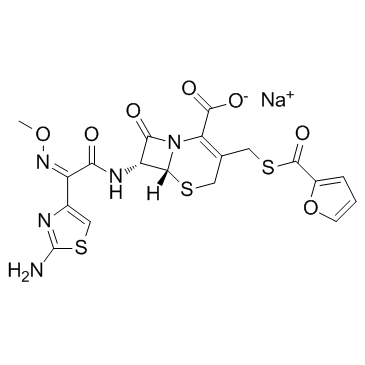
-
GC32229
Ceftizoxime
Ceftizoxime is a bacterial inhibitor which acts by interfering with bacterial cell wall synthesis and inhibiting cross-linking of the peptidoglycan.
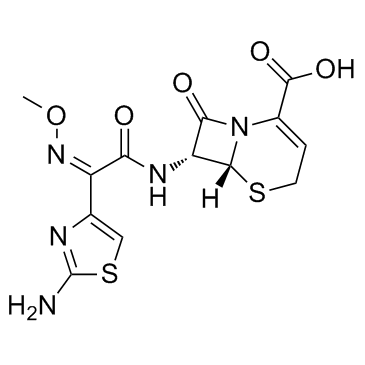
-
GC32180
Ceftizoxime sodium (SKF-88373)
FR 13479
Ceftizoxime sodium (SKF-88373) (SKF-88373) is third generation cephalosporin effective against Gram-negative and Gram-positive bacteria.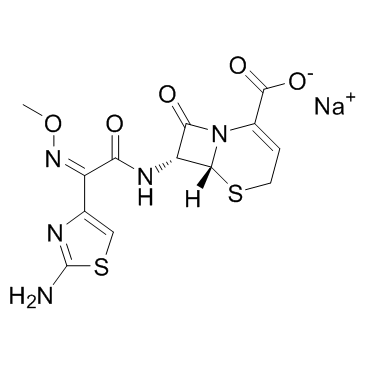
-
GC32128
Ceftobiprole (Ro 63-9141)
Ceftobiprole (Ro 63-9141) (Ro 63-9141) is a broad-spectrum cephalosporin with high levels of in vitro activity against methicillin- (MRSA) and vancomycin-resistant staphylococci (VRSA) and penicillin-resistant streptococci with a MIC90 value of 2 μg/mL for MRSA.
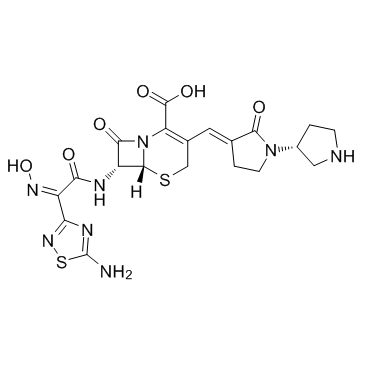
-
GC68005
Ceftobiprole medocaril sodium

-
GC71542
Ceftolozane
Ceftolozane (CXA-101 free base; FR264205 free base) is a cephalosporin antibiotic with potent activity againstPseudomonas aeruginosa and strains Enterobacteriaceae, with MICs of 0.5 and 0.25-0.5 mg/L.

-
GC35648
Ceftriaxone
Ceftriaxone is a third-generation cephalosporin antibiotic with excellent activity against many gram-negative, and reasonable activity against most gram-positive microorganisms.
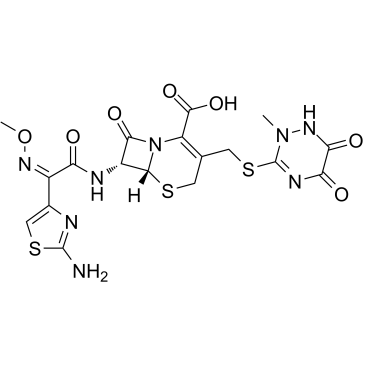
-
GC32075
Ceftriaxone sodium salt (Disodium ceftriaxone)
Ceftriaxone sodium salt (Disodium ceftriaxone) (Disodium ceftriaxone) is a third-generation cephalosporin antibiotic with excellent activity against many gram-negative, and reasonable activity against most gram-positive microorganisms.
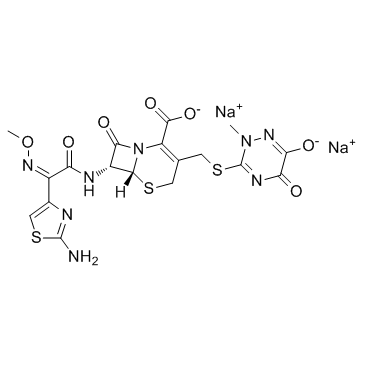
-
GC11349
Ceftriaxone Sodium Trihydrate
Ceftriaxone disodium hemiheptahydrate, Ro 13-9904, Rosihlitazone
Ceftriaxone Sodium Trihydrate (Ceftriaxone disodium hemiheptahydrate) is a third-generation cephalosporin antibiotic with excellent activity against many gram-negative, and reasonable activity against most gram-positive microorganisms.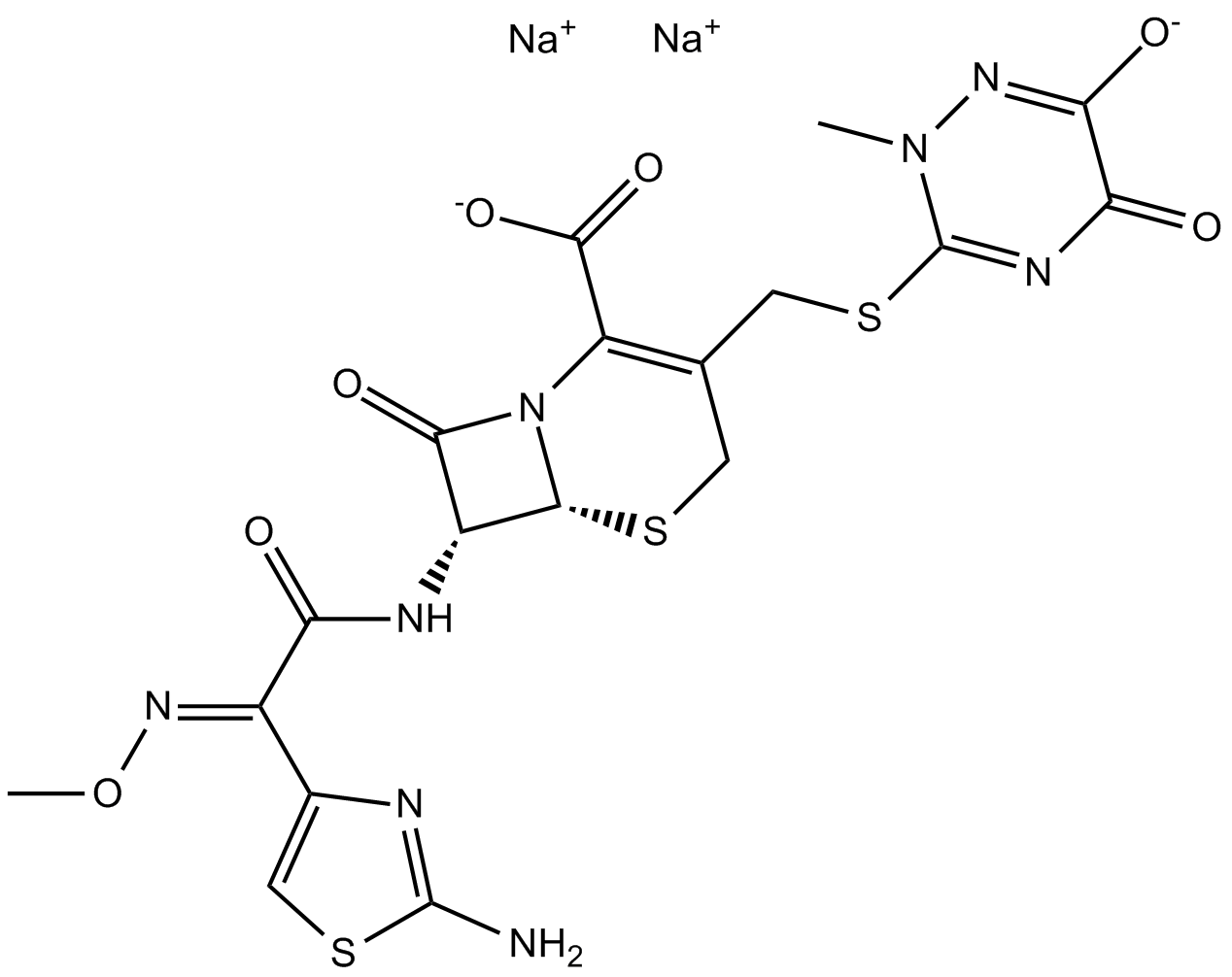
-
GC71669
Ceftriaxone-d3 disodium
Ceftriaxone-d3 (disodium) is the deuterium labeled Ceftriaxone.

-
GC33998
Cefuracetime (SKF81367)
SKF81367 is a cephalosporin antibiotic.
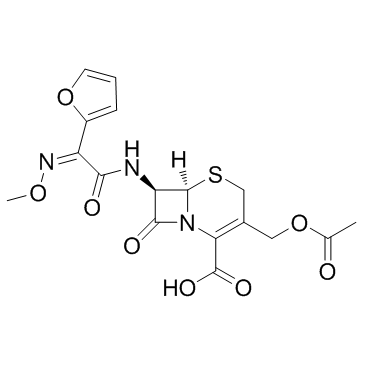
-
GC18670
Cefuroxime
Cefuroxime is an orally active second-generation cephalosporin antibiotic with increased stability to β-lactamase.

-
GC39548
Cefuroxime axetil
Cefuroxime Axetil, a prodrug of the cephalosporin cefuroxime and an oarl broad spectrum antibiotic, inhibits several gram-positive and gram-negative organisms, including those most frequently associated with various common community-acquired infections.
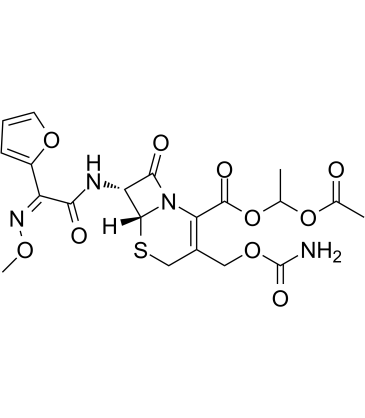
-
GC32086
Cefuroxime sodium (Cefuroxime sodium salt)
Cefuroxime sodium (Cefuroxime sodium salt) is an orally active second-generation cephalosporin antibiotic with increased stability to β-lactamase.
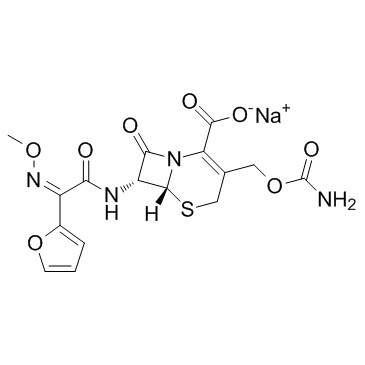
-
GC47069
Cefuroxime-d3
An internal standard for the quantification of cefuroxime
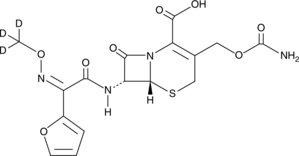
-
GC14356
Celastramycin A
inhibits the growth of bacteria and mycobacteria
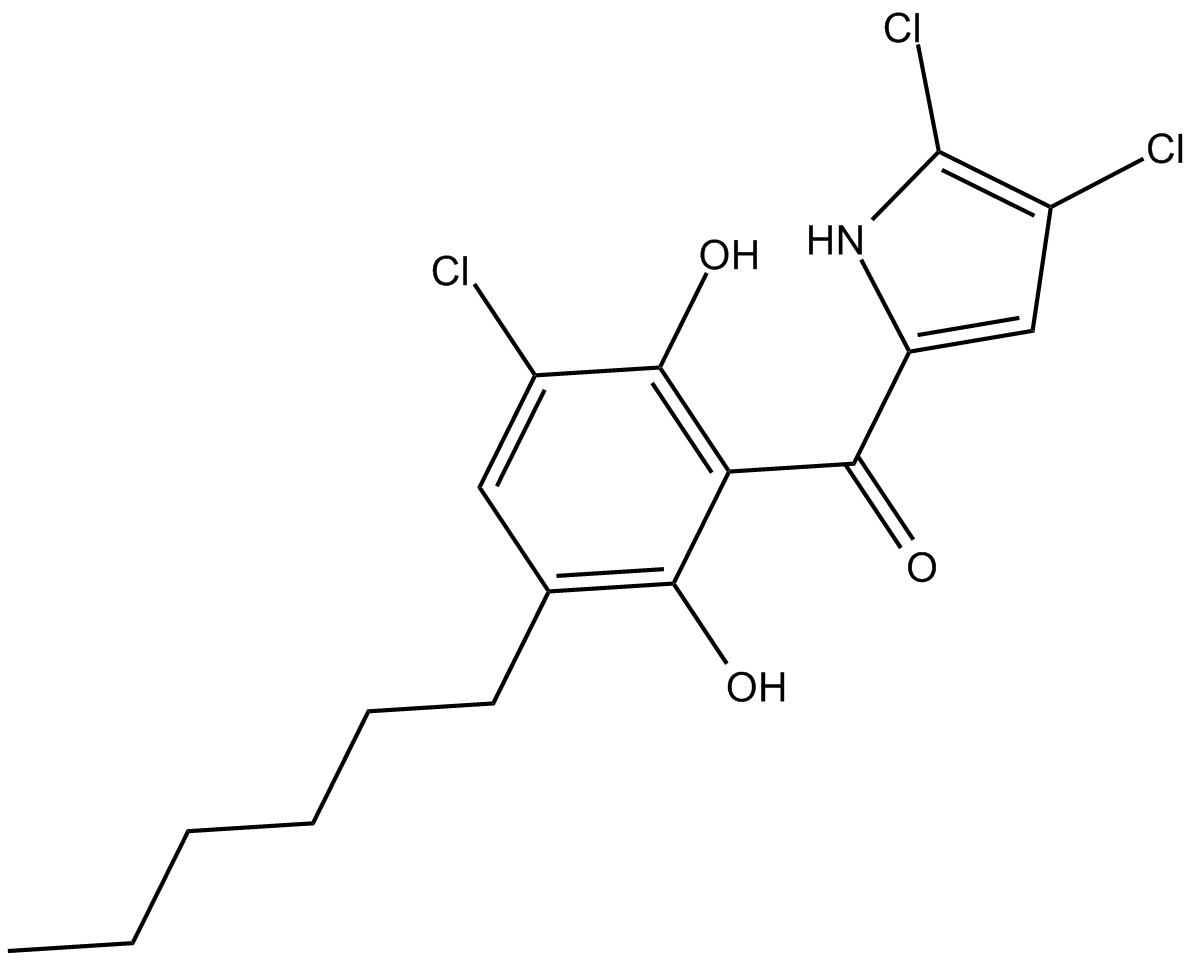
-
GC32191
Celgosivir (MBI 3253)
MBI 3253; MDL 28574; MX3253
Celgosivir (MBI 3253) (MBI 3253; MDL 28574; MX3253) is an α-glucosidase I inhibitor; inhibits bovine viral diarrhoea virus (BVDV) with an IC50 of 1.27 μM in in vitro assay.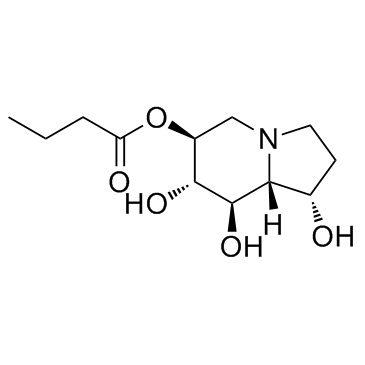
-
GC32074
Celgosivir hydrochloride (MBI 3253 (hydrochloride))
MBI 3253 hydrochloride; MDL 28574 hydrochloride; MX3253 hydrochloride
Celgosivir hydrochloride (MBI 3253 (hydrochloride)) (MBI 3253 hydrochloride; MDL 28574 hydrochloride; MX3253 hydrochloride) is an α-glucosidase I inhibitor; inhibits bovine viral diarrhoea virus (BVDV) with an IC50 of 1.27 μM in in vitro assay.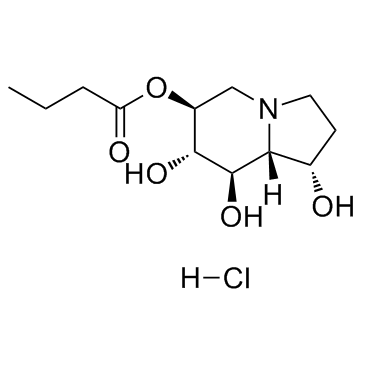
-
GC19101
Cenicriviroc
TAK-652
Cenicriviroc (CVC) is an oral, dual CCR2/CCR5 antagonist with nanomolar potency against both receptors.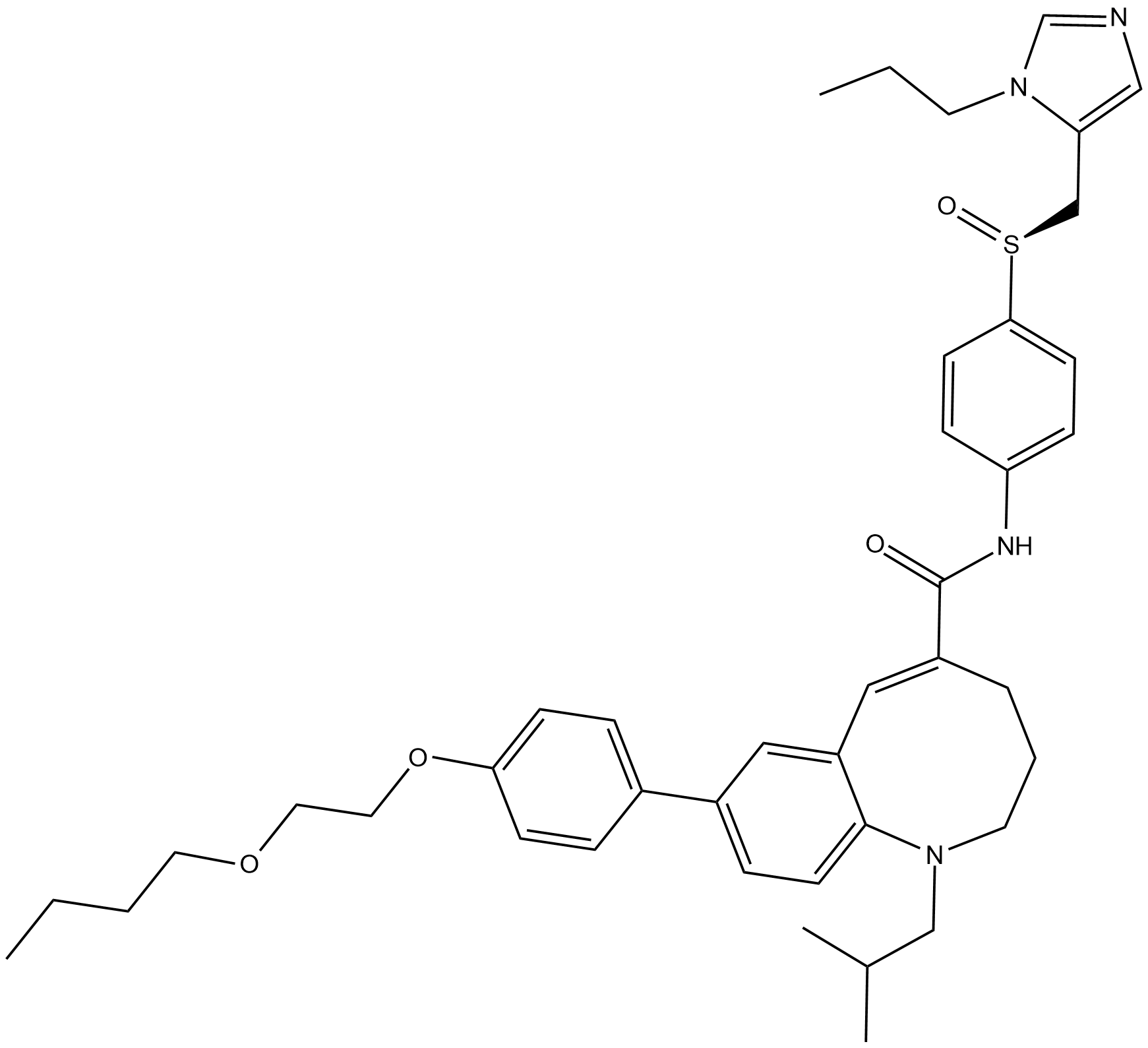
-
GC35650
Cenicriviroc Mesylate
TAK-652 Mesylate; TBR-652 Mesylate
Cenicriviroc Mesylate (TAK-652 Mesylate) is a dual CCR2/CCR5 antagonist, also inhibits both HIV-1 and HIV-2, and displays potent anti-inflammatory and antiinfective activity.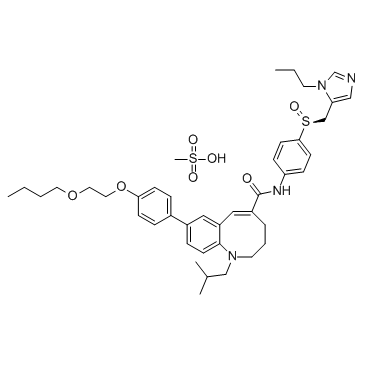
-
GC64261
Censavudine
OBP-601; BMS-986001
Censavudine (OBP-601; BMS-986001), a nucleoside analog, is a nucleoside reverse transcriptase inhibitor.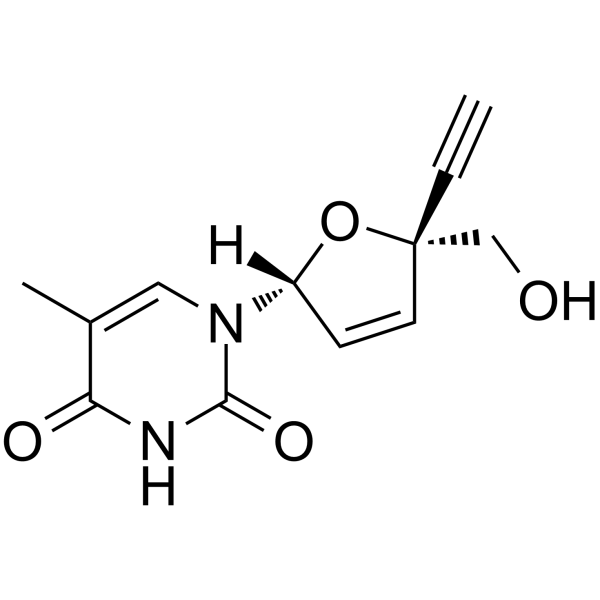
-
GC49593
Cephacetrile
Cefacetrile, 7-Cyanoacetamidocephalosporanic Acid
Cephacetrile (Cephacetrile) is a broad-spectrum antibiotic that is effective in gram-positive and gram-negative bacterial infection.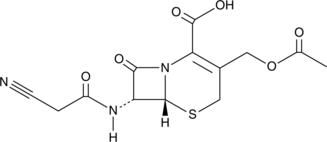
-
GC43228
Cephaeline
(-)-Cephaeline
Cephaeline is an alkaloid originally isolated from C.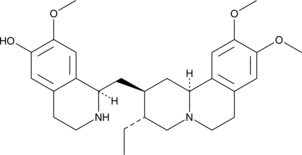
-
GC15625
Cephalexin
Cefalexin
Antibiotic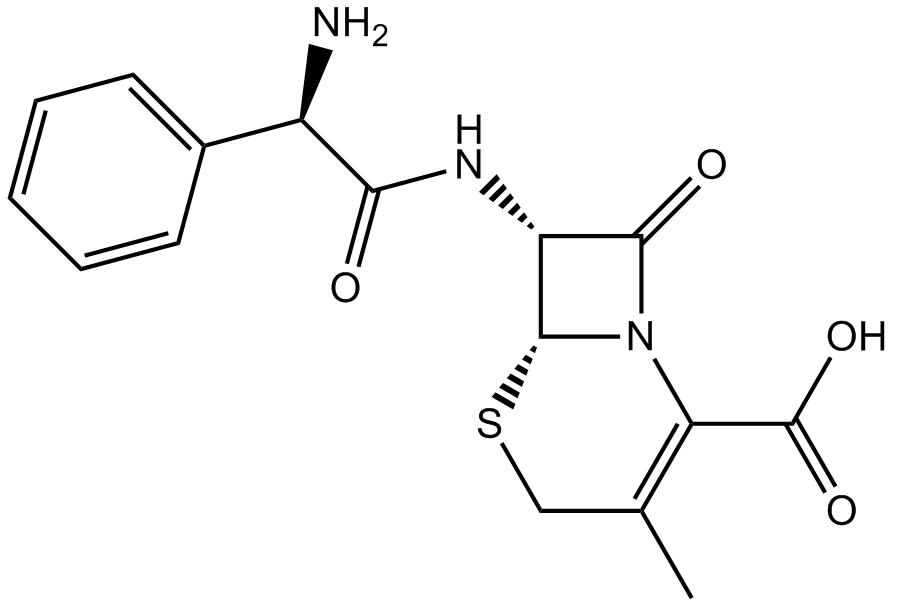
-
GC13641
Cephalexin hydrochloride
Cephalosporin antibiotic
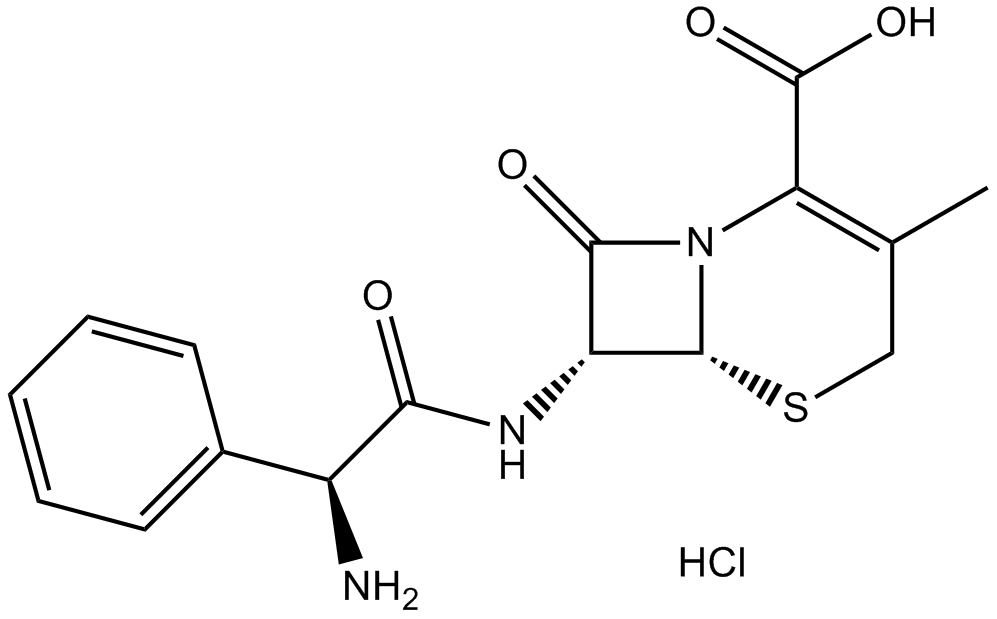
-
GC15593
Cephalexin monohydrate
Semisynthetic cephalorsporin antibiotic
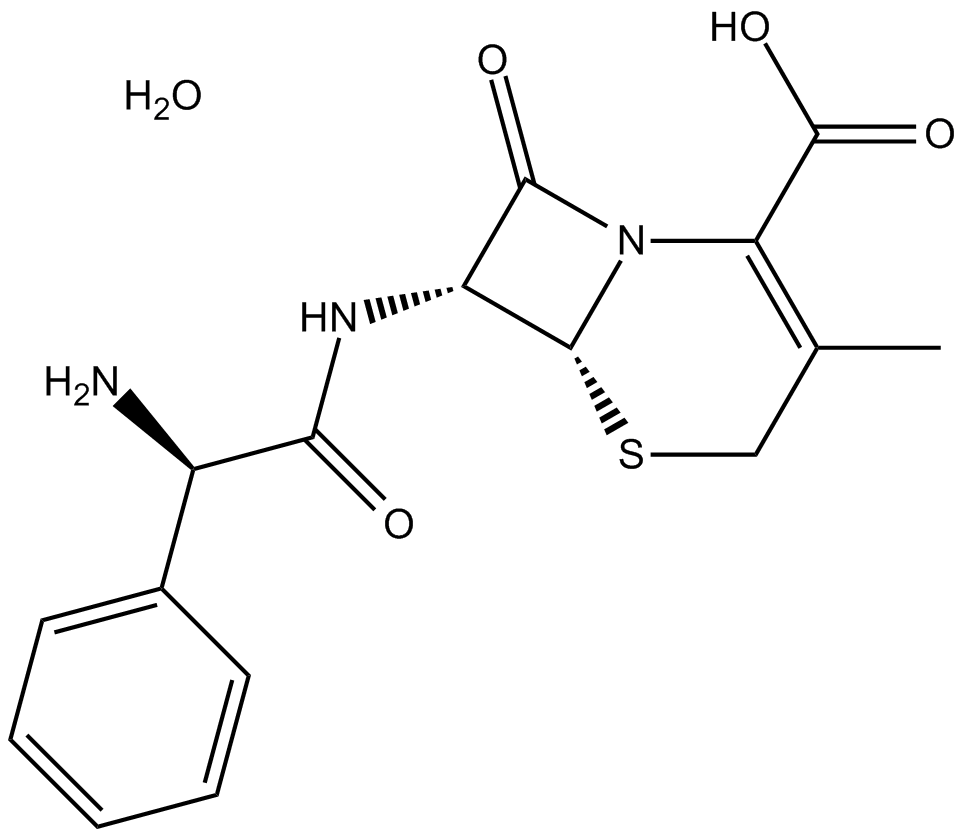
-
GC68853
Cephaloridine hydrate
Cephaloridine hydrate is a broad-spectrum antibiotic. It has some dose-related kidney toxicity.

-
GC35653
Cephalotaxlen
(–)-Cephalotaxine, NSC 128487, NSC 245454, ZINC19795976
Cephalotaxlen ((-)-Cephalotaxlen) is an alkaloid that can be isolated from Cephalotaxus drupacea, with antileukemic and antiviral activities.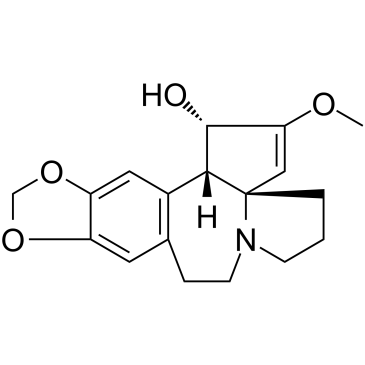
-
GC11507
Cephalothin
NULL
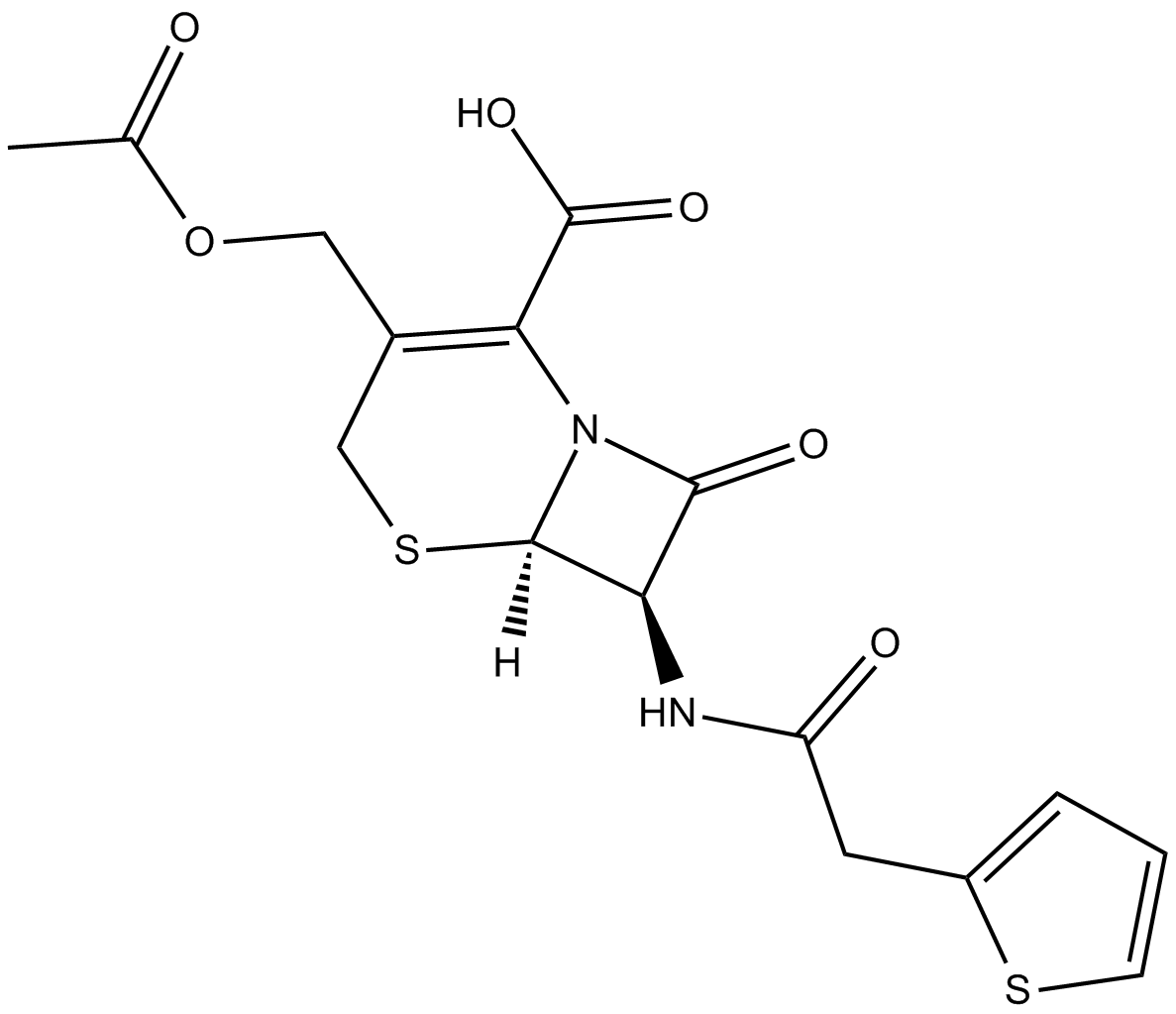
-
GC38664
Cephalothin sodium
Cephalothin sodium is a first generation cephem antibiotic with a wide range antibacterial activity, is active against gram-positive and gram-negative bacteria.
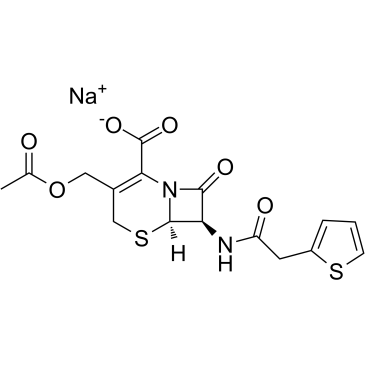
-
GC19760
Cephapirin Benzathine
Cephapirin Benzathine is the benzathine salt form of cephapirin.

-
GC38188
Cephapirin sodium
Cephapirin sodium (Cefapirin sodium) is an ephalosporin antibiotic with broad-spectrum antimicrobial activity.
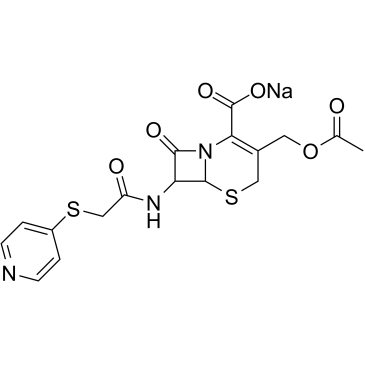
-
GN10113
Cepharanthine
O-Methylcepharanoline, NSC 623442
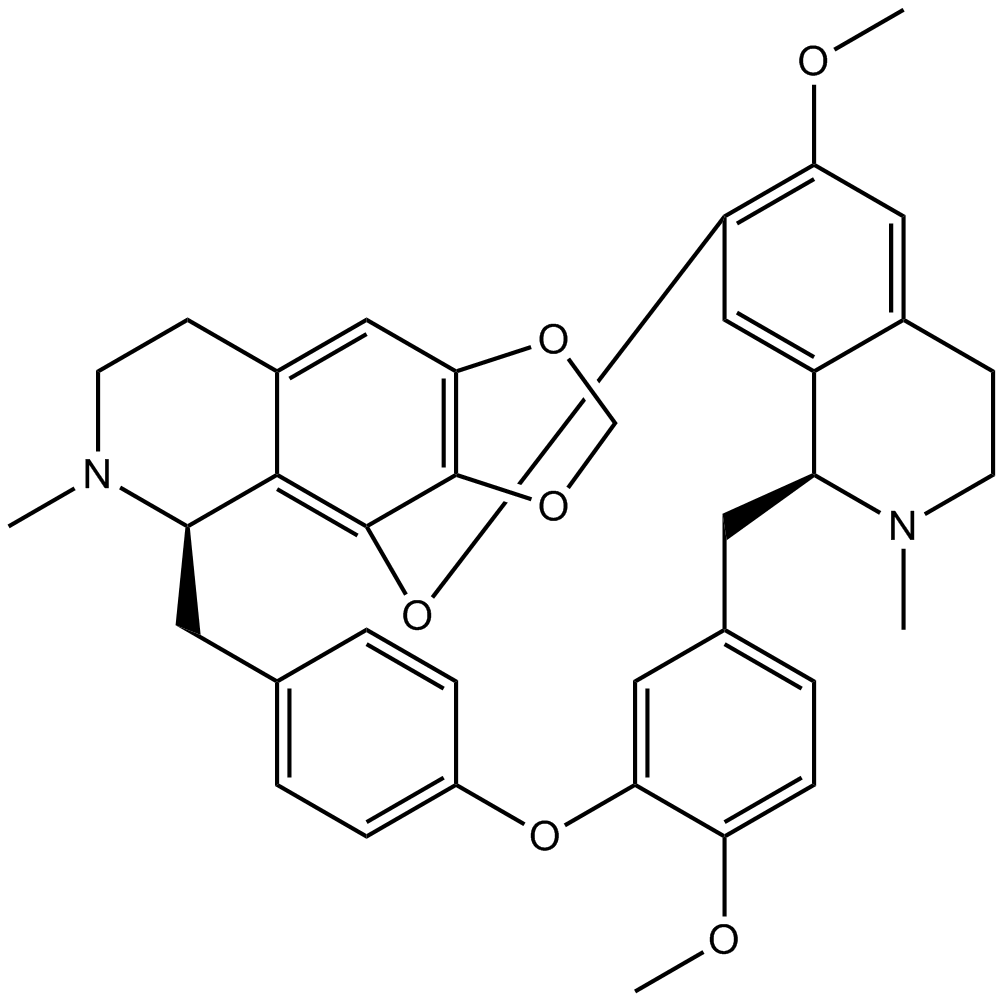
-
GC25218
Cephradine monohydrate
Cefradine is a beta-lactam, first-generation cephalosporin antibiotic with bactericidal activity.
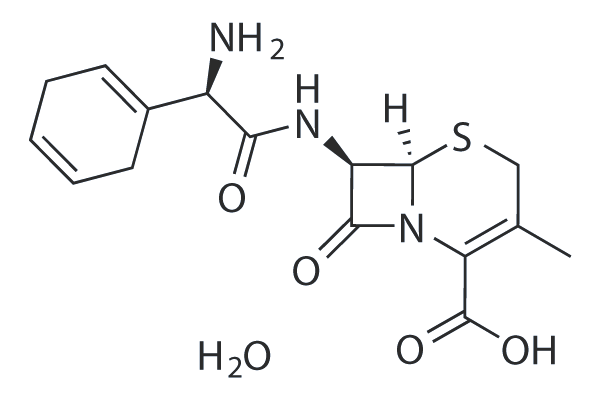
-
GC32323
Ceratotoxin A
Ceratotoxin A, a 29-residue peptide isolated from the accessory gland secretion fluid, with strong anti-bacterial activity.
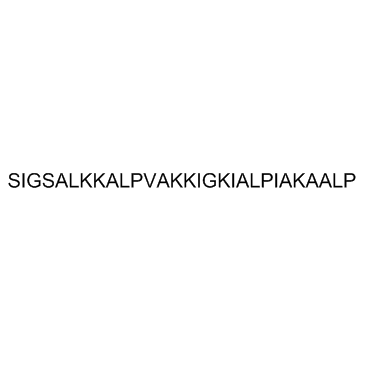
-
GC15391
Cercosporamide
(-)-Cercosporamide
A potent inhibitor of fungal Pkc1 and mammalian Mnk isoforms
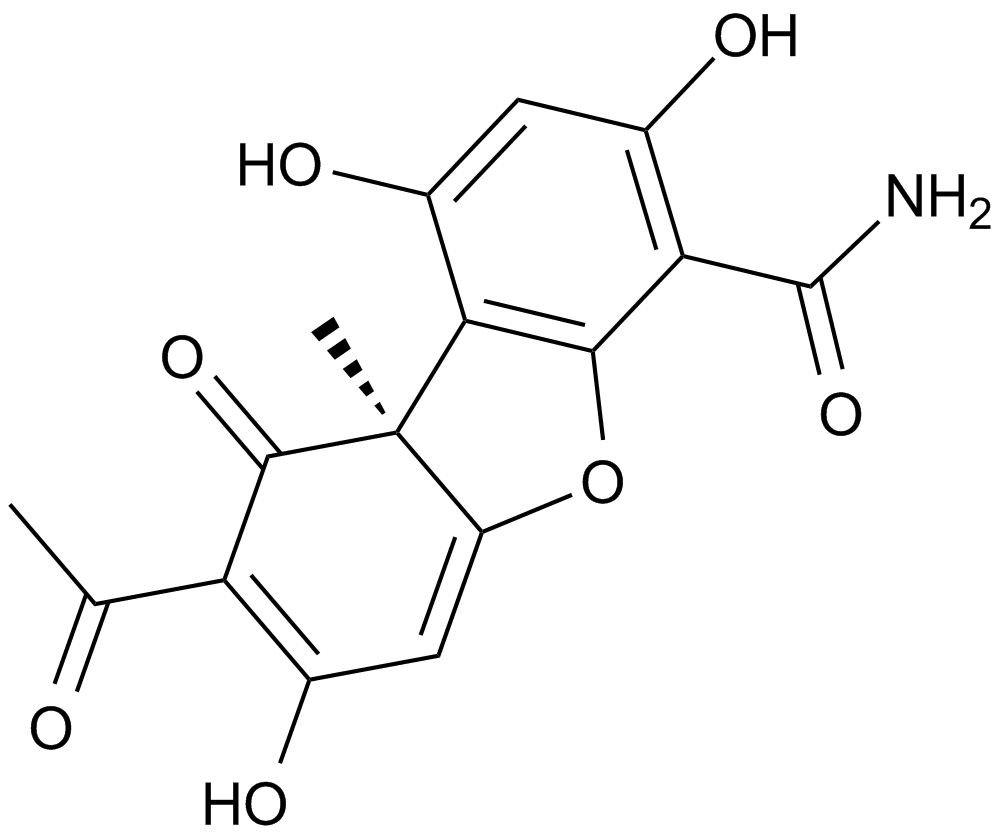
-
GC65430
Cerebroside B
Cerebroside B, a sphingolipid compound, is a non-racespecific elicitor, which elicits defense responses in rice.
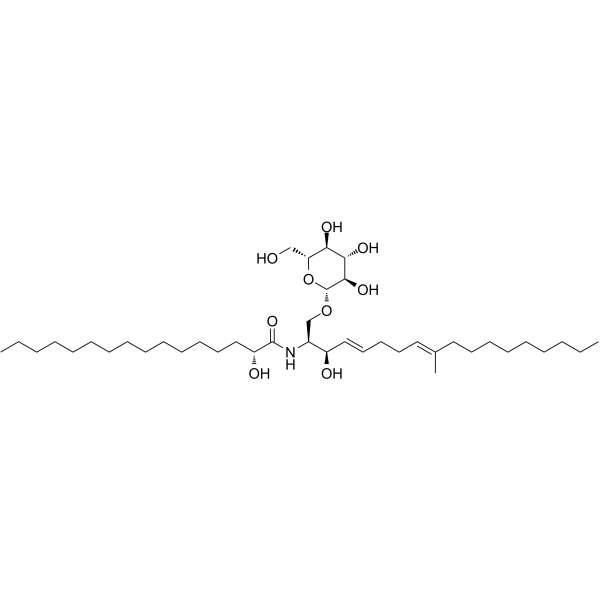
-
GC60689
Cetalkonium chloride
Cetalkonium chloride is an ammonium antiseptic agent used in many topical drugs for infections of mouth, throat and eye.
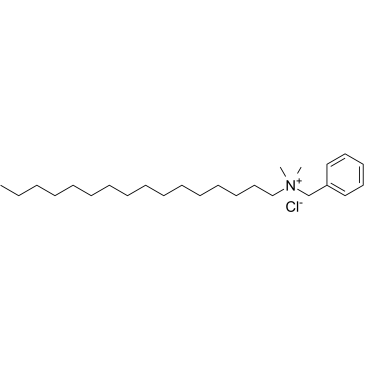
-
GC65087
Cethromycin
Cethromycin (ABT-773) is a ketolide antibiotic.
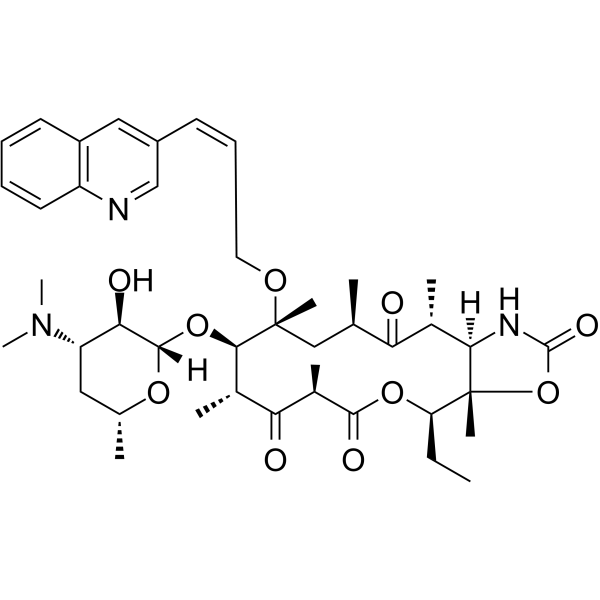
-
GC11689
Cetylpyridinium Chloride
Hexadecylpyridinium
Cationic quaternary ammonium compound used as oropharyngeal antiseptic.
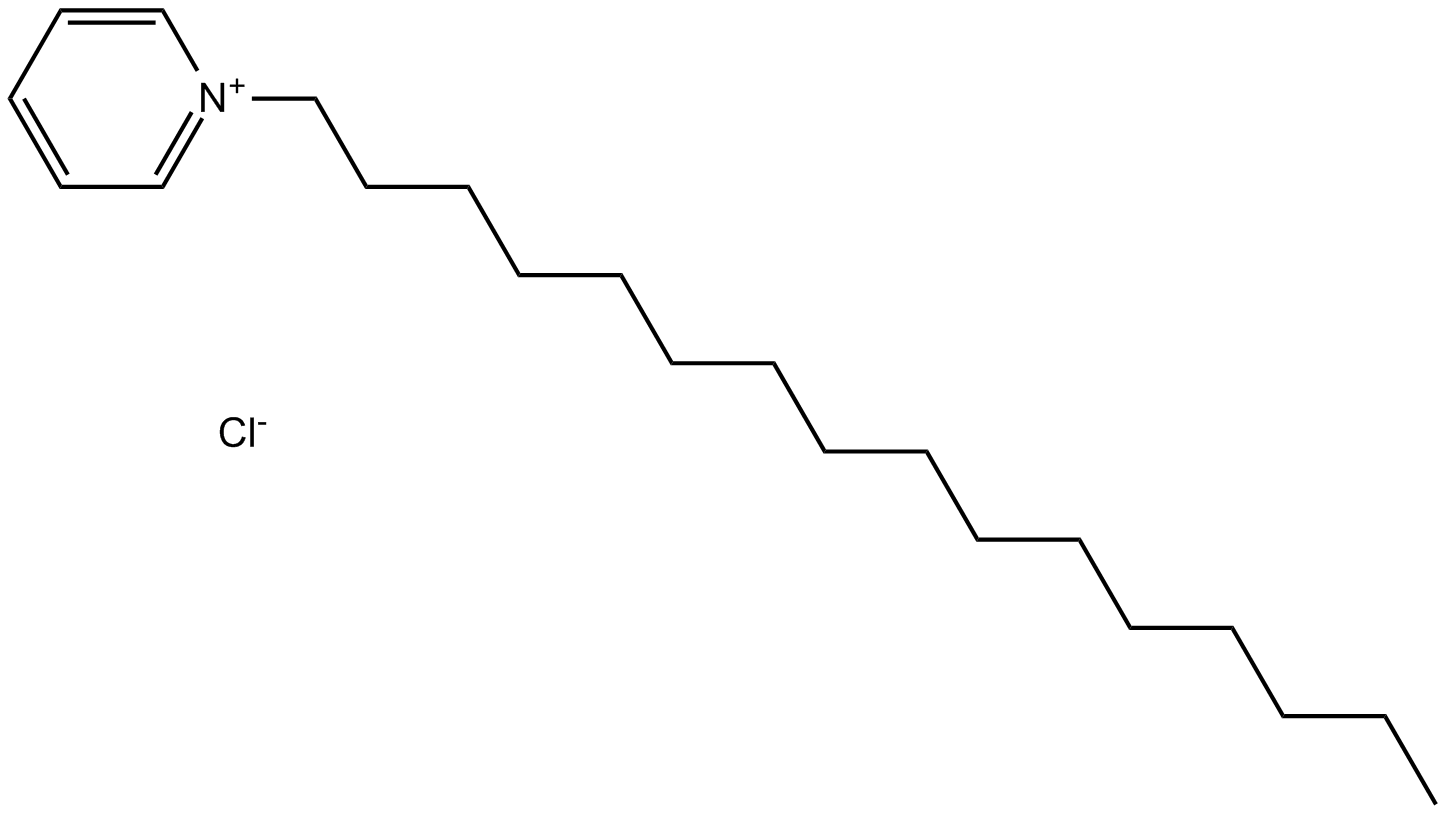
-
GC35658
Cetylpyridinium chloride monohydrate
Cetylpyridinium chloride monohydrate is a cationic quaternary ammonium compound, used in some types of mouthwashes, toothpastes, throat and nasal sprays, is an antiseptic that kills bacteria and other microorganisms, effective in preventing dental plaque and reducing gingivitis.
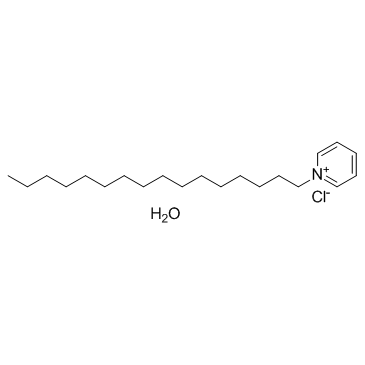
-
GC63826
Chalcone
Chalcone is isolated from Glycyrrhizae inflata and used to synthesize chalcone derivatives.
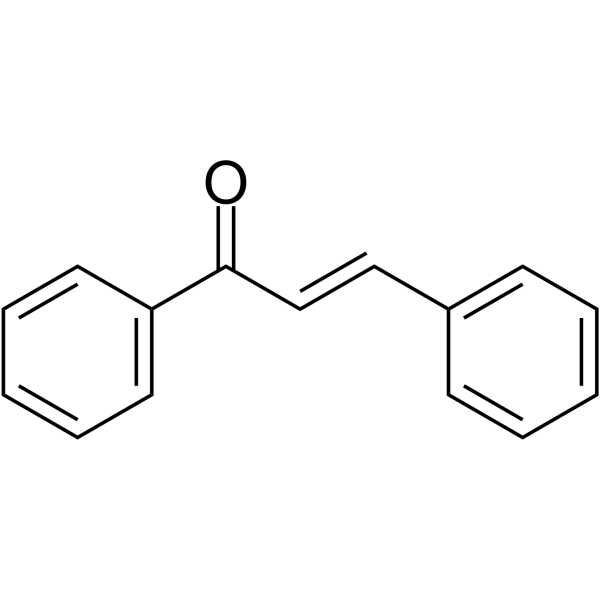
-
GC70407
Chalcone 4 hydrate
Chalcone 4 hydrate is an anti-parasite agent, inhibits the growth of Babesia and Theileria.

-
GC68859
Chamaechromone
Chamaechromone is a flavonoid component isolated from the roots of plants in the thyme family. It has anti-hepatitis B virus (HBV) activity, inhibits the surface secretion antigen (HBsAg) of hepatitis B virus, and also has insecticidal activity.
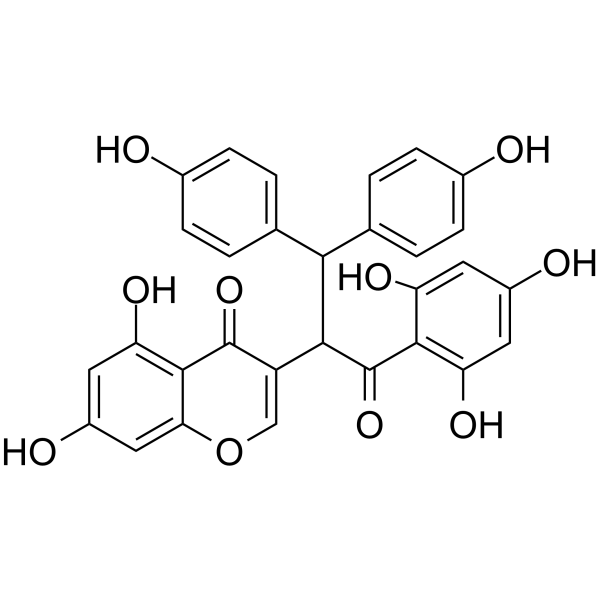
-
GC31707
Chebulagic acid
Chebulagic acid is a COX-LOX dual inhibitor isolated from the fruits of Terminalia chebula Retz, on angiogenesis.
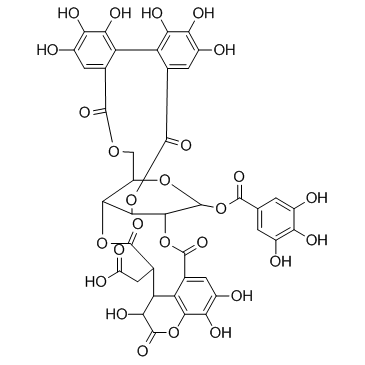
-
GC14386
CHIR-090
CHIR 090;CHIR090
An antibiotic and LpxC inhibitor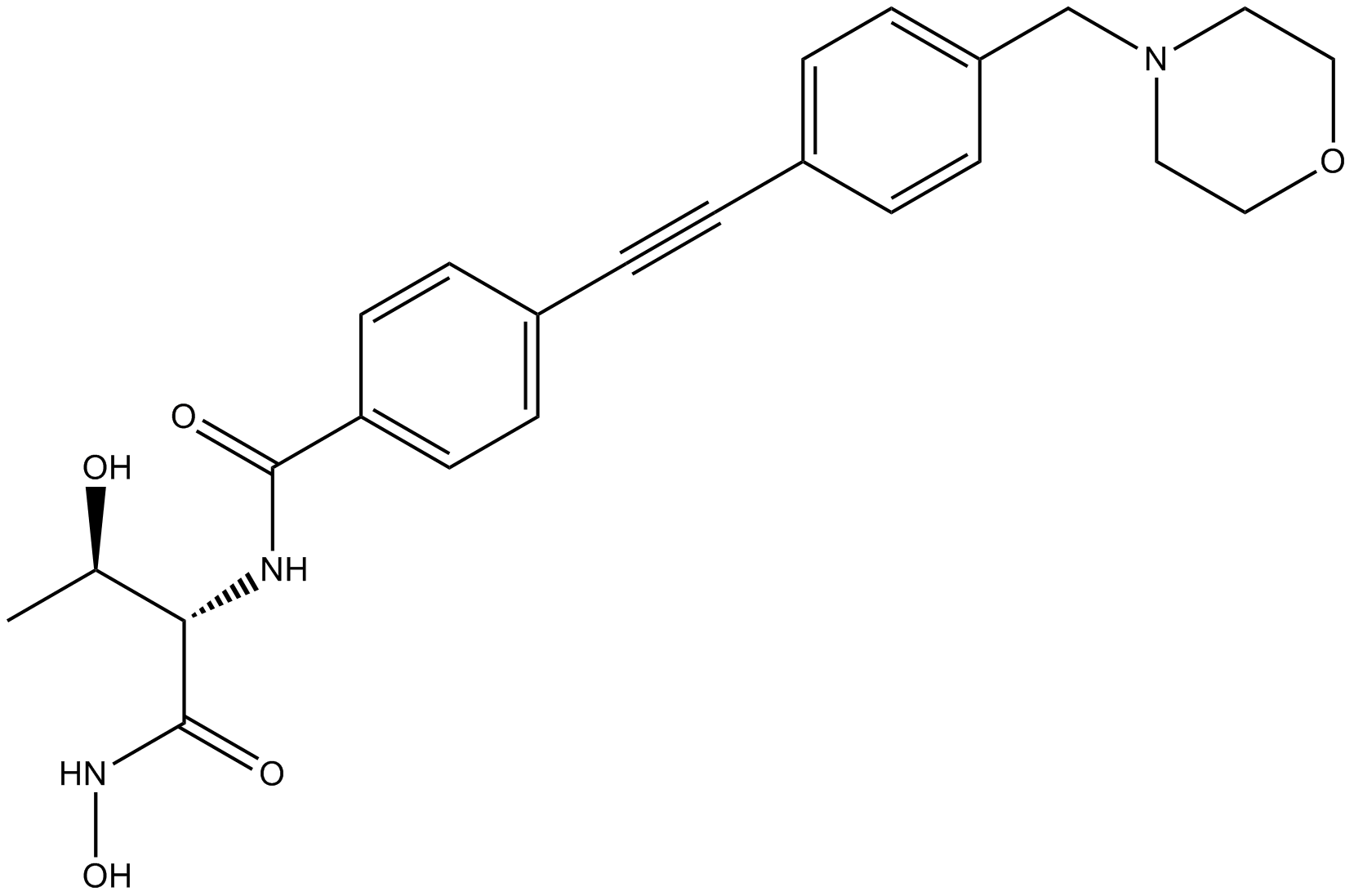
-
GC68860
Chitin synthase inhibitor 4
Chitin synthase inhibitor 4 (compound 4fh) is a chitin synthase (CHS) inhibitor with fungicidal properties. Chitin synthase inhibitor 4 is a potential CHS-based agricultural fungicide.
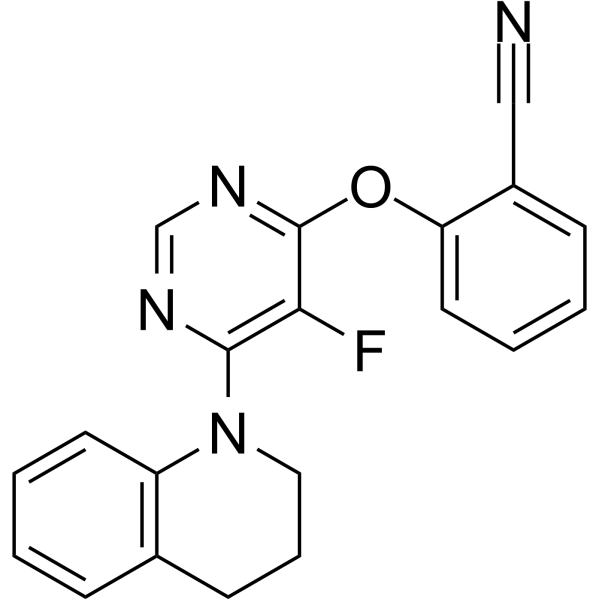
-
GC72154
Chitinase, serratia marcescens
Chitinase (EC 3.2.1.14) has partial lysozyme activity and is widely found in bacteria, fungi, animals and some plants.

-
GC35676
Chitinase-IN-1
Chitinase-IN-1 is a insect chitinase and N- acetyl hexosaminidase inhibitor and pesticide; 50 uM/20 uM compound concentration's inhibitory percentage are 75%/67% for chitinase/N- acetyl-hexosaminidase respectively.
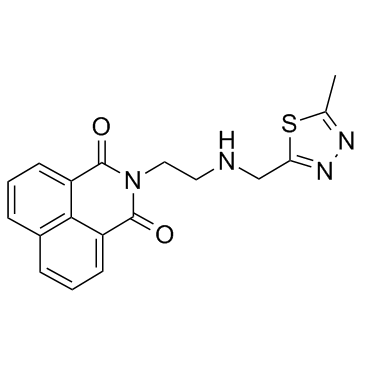
-
GC34082
Chitosan (Deacetylated chitin)
Chitosan (Deacetylated chitin) (Deacetylated chitin) is a polycationic linear polysaccharide derived from chitin.
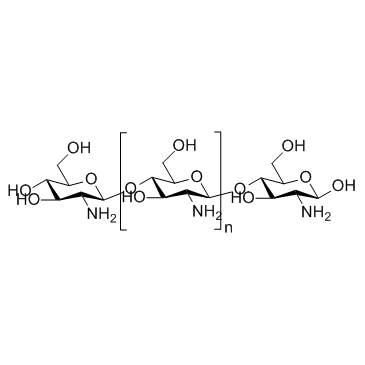
-
GC47079
Chloramine-T (hydrate)
A common reagent
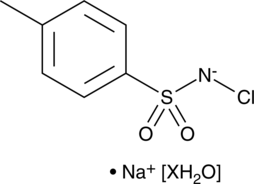
-
GC15185
Chloramphenicol
Chloramphenicol is a highly lipid-soluble broad-spectrum antibiotic for bacterial infections. Chloramphenicol inhibits protein synthesis by binding to the 50S subunit of the ribosome, thus acting as an antibacterial agent. Chloramphenicol can be used in the treatment of meningitis and cancer research.
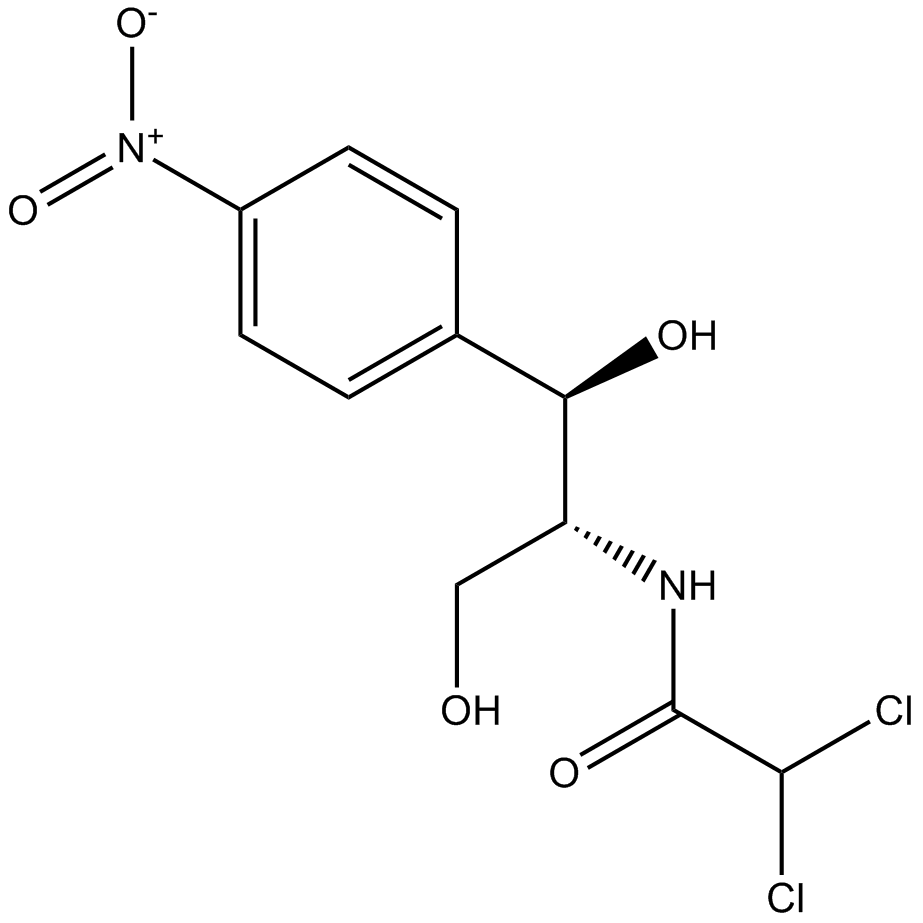
-
GC43241
Chloramphenicol Palmitate
Chloramphenicol palmitate is an orally bioavailable ester prodrug form of the antibiotic chloramphenicol.

-
GC43242
Chloramphenicol Succinate
Chloramphenicol succinate is a water-soluble prodrug form of the antibiotic chloramphenicol.
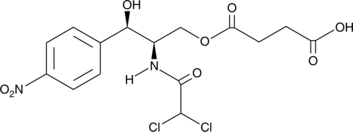
-
GC39661
Chloramphenicol succinate sodium
Chloramphenicol succinate sodium is a prodrug of Chloramphenicol, with Haemotoxicity.
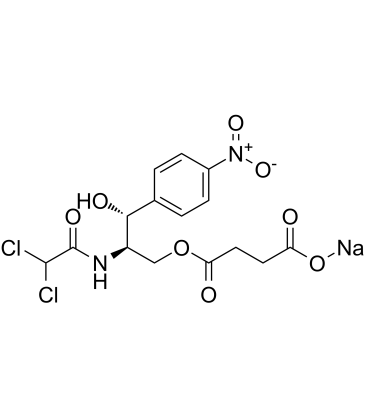
-
GC71628
Chloramphenicol-d5
Chloramphenicol-d5 is the deuterium labeled Chloramphenicol.

-
GC32394
Chlordantoin (Clodantoin)
Chlordantoin (Clodantoin) is an antifungal agent and has the potential for vaginal candidiasis treatment.
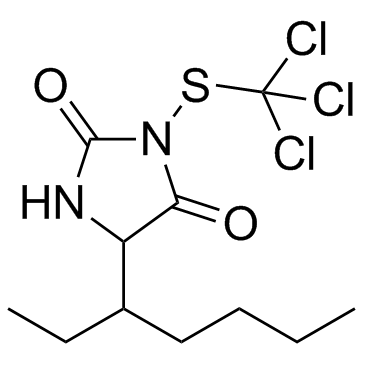
-
GC35680
Chlorhexidine
Chlorhexidine is an antibacterial used as an antiseptic and for other applications.
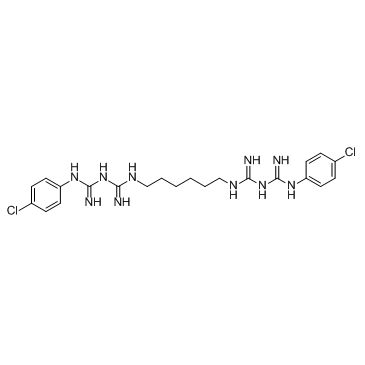
-
GC43243
Chlorhexidine (acetate hydrate)
CHX
Chlorhexidine is a bis(biguanide) antimicrobial disinfectant and antiseptic agent.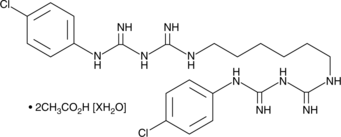
-
GC60699
Chlorhexidine diacetate
Chlorhexidine diacetate is a biguanide disinfectant with rapid bactericidal activity against both Gram-positive and Gram-negative organism.
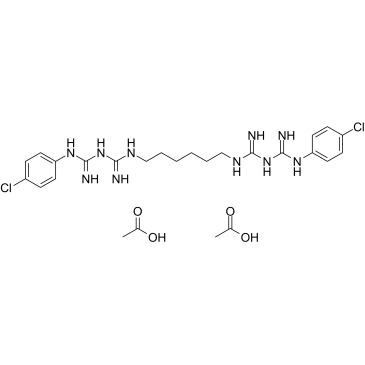
-
GC16201
Chlorhexidine digluconate
antiseptic
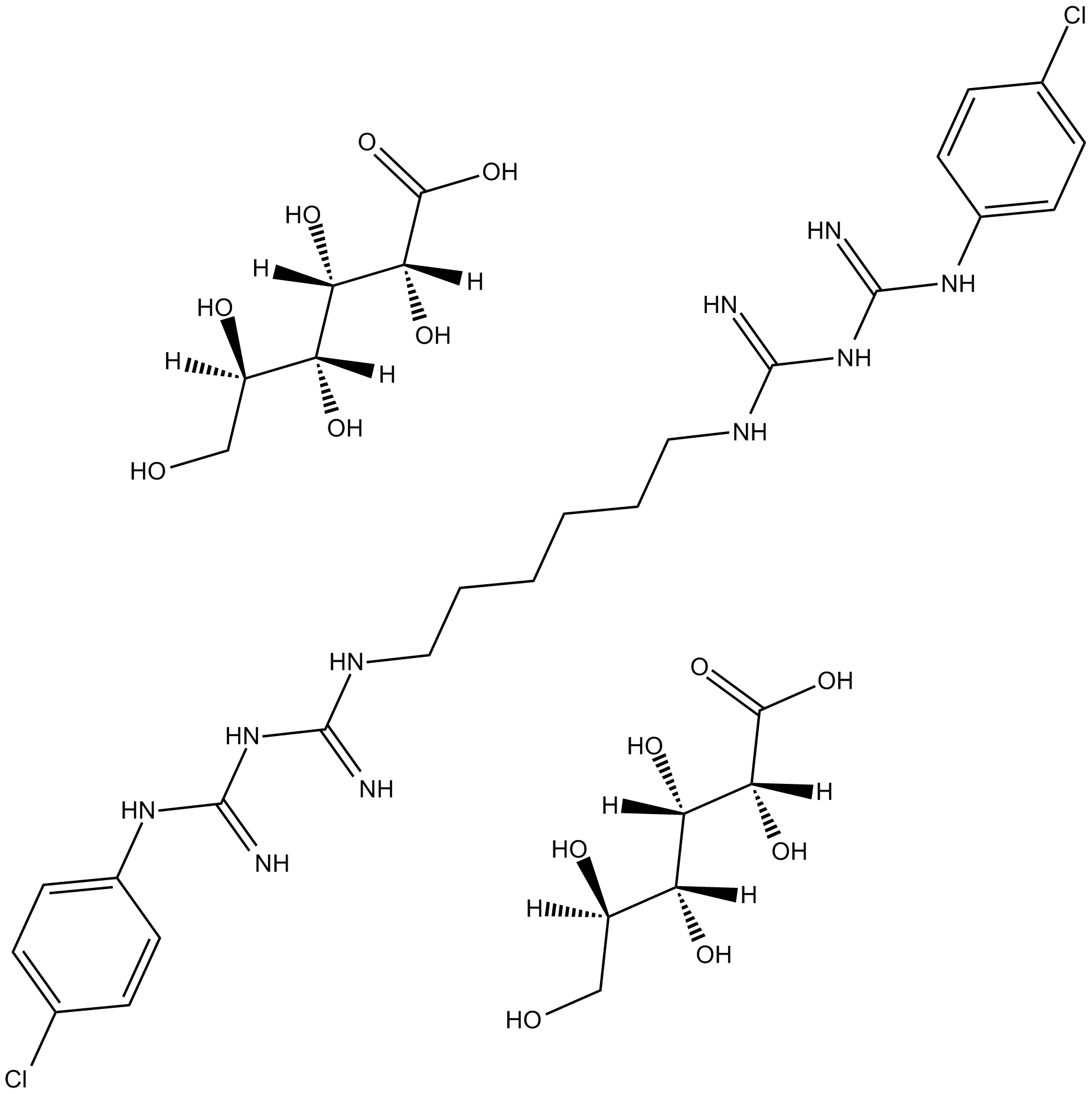
-
GC15204
Chlorhexidine HCl
CHX
Chlorhexidine HCl is an antibacterial, used as an antiseptic and for other applications.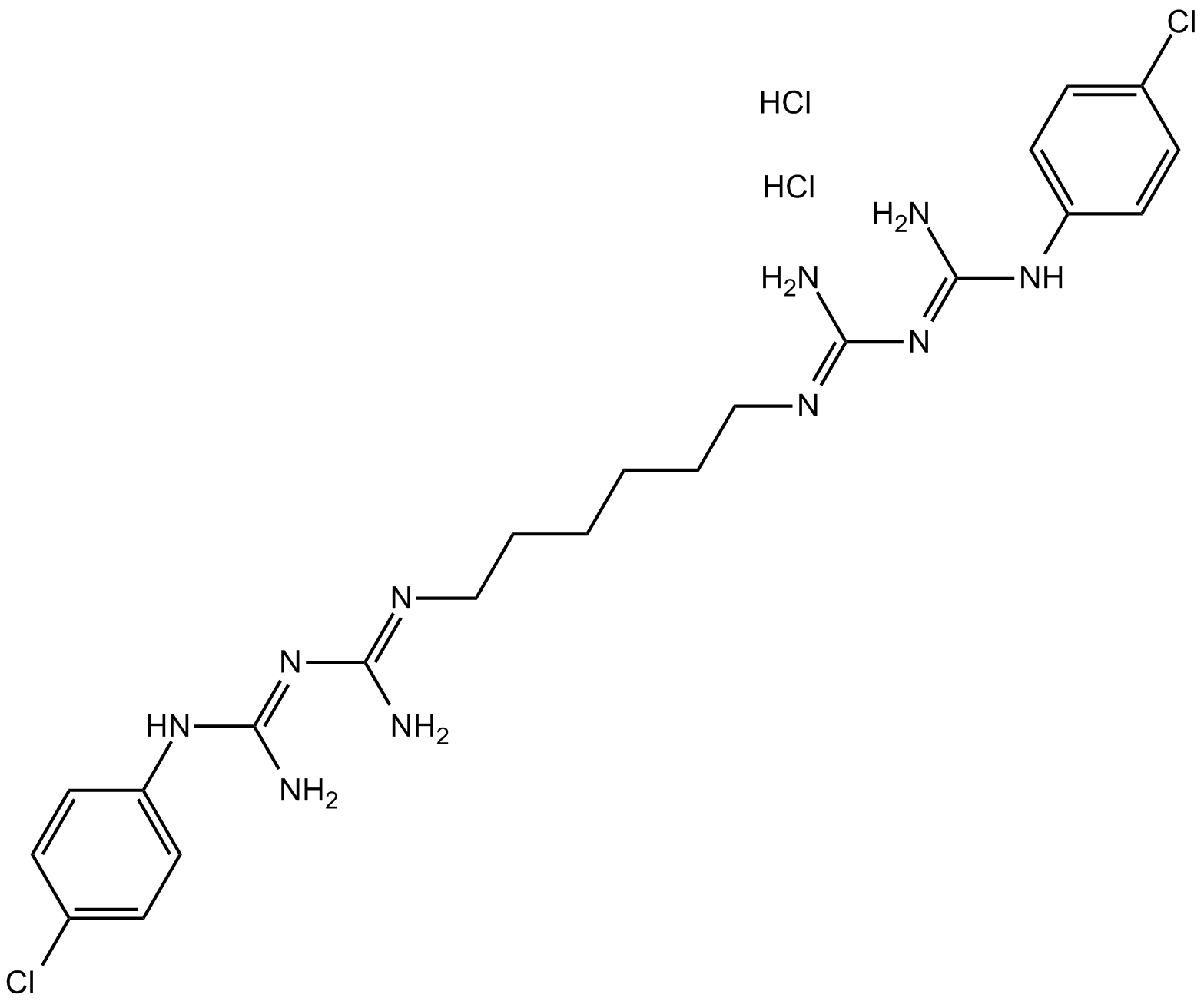
-
GC39601
Chlormidazole hydrochloride
Clomidazole hydrochloride
Chlormidazole hydrochloride is an antifungal agent and has inhibitory activity against many fungi and some gram-positive cocci.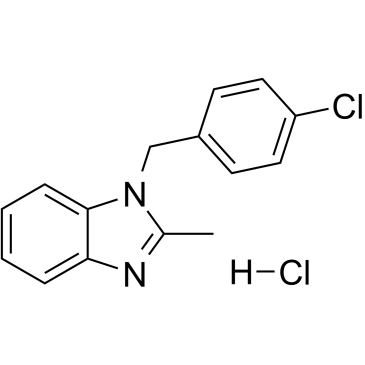
-
GC39358
Chlorobutanol
Chlorobutanol is a pharmaceutical preservative.
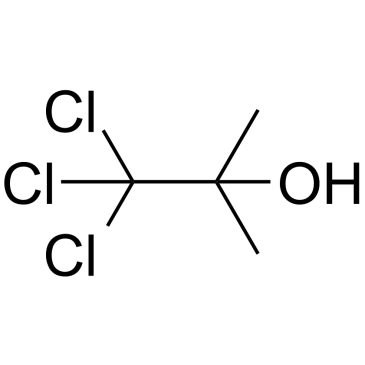
-
GC62358
Chlorobutanol hemihydrate
Chlorobutanol hemihydrate is a pharmaceutical preservative.
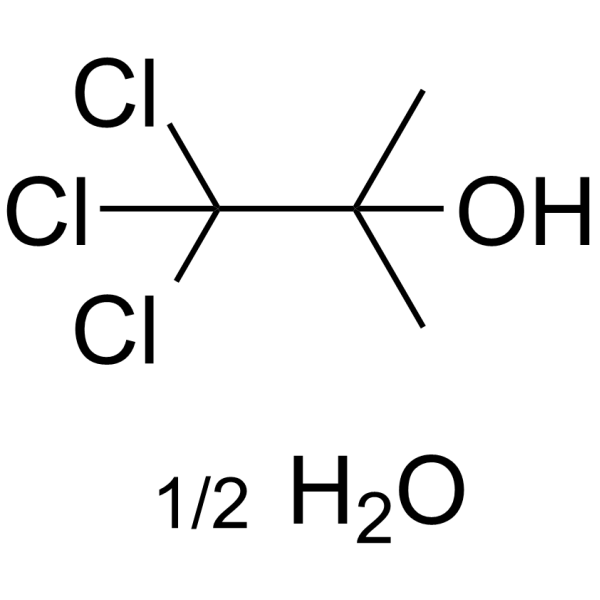
-
GC19549
Chloroquine
CHLORO QUINE PHOSPHATE; 4-(7-chloro-4-quinolylamino)pentyldiethylamine; (4S)-N~4~-(7-chloroquinolin-4-yl)-N~1~,N~1~-diethylpentane-1,4-diamine
An autophagy and toll-like receptors (TLRs) inhibitor
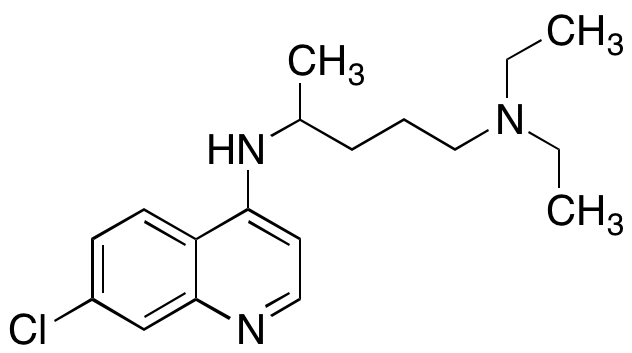
-
GC60700
Chloroquine D5
Chloroquine D5 is deuterium labeled Chloroquine.
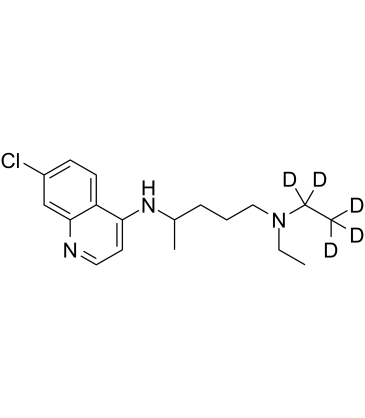
-
GC10295
Chloroquine diphosphate
DL-Chloroquine, NSC 14050
Chloroquine diphosphate is an antimalarial and anti-inflammatory agent widely used to treat malaria and rheumatoid arthritis.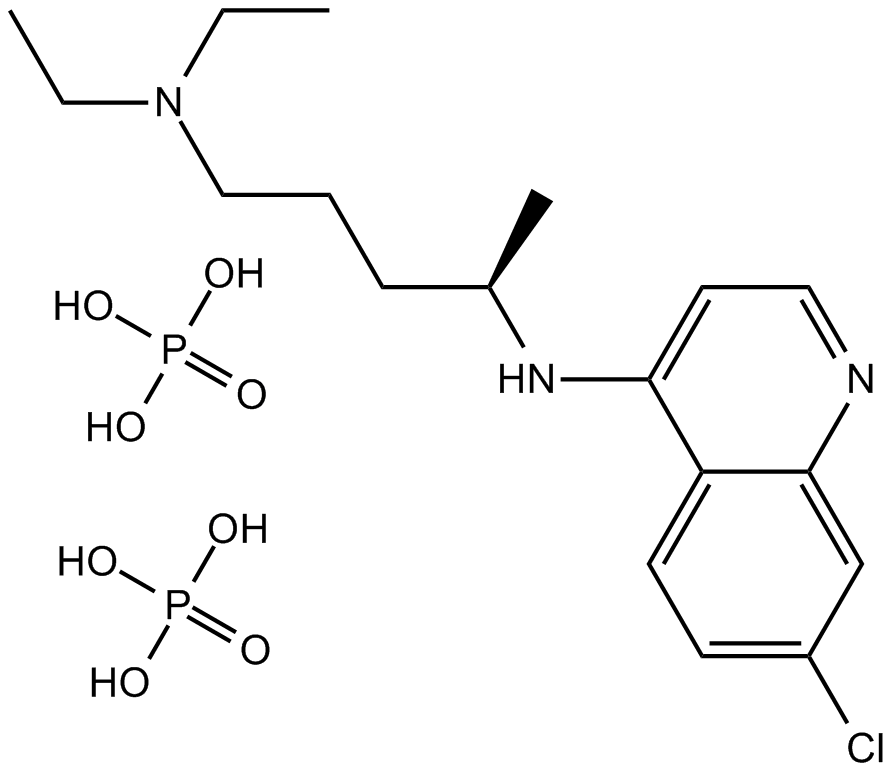
-
GC45885
Chloroquine-d5 (phosphate)
DL-Chloroquine-d5
An internal standard for the quantification of chloroquine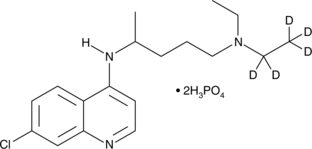
-
GC60107
Chloroquinoxaline sulfonamide
Chloroquinoxaline sulfonamide (Chloroquinoxaline), a structural analogue of sulfaquinoxaline, is a topoisomerase II alpha/beta poison.
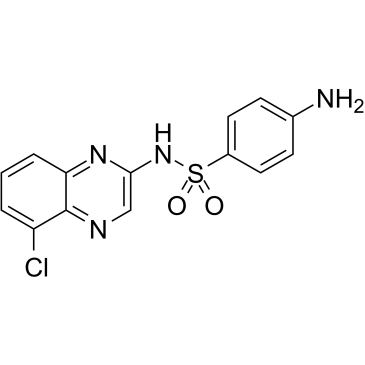
-
GC47082
Chlorothalonil
2,4,5,6-Tetrachloroisophthalonitrile
A broad-spectrum organochlorine fungicide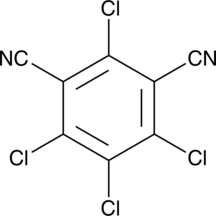
-
GC16628
Chlorothricin
Antibiotic K 818A
macrolide-type antibiotic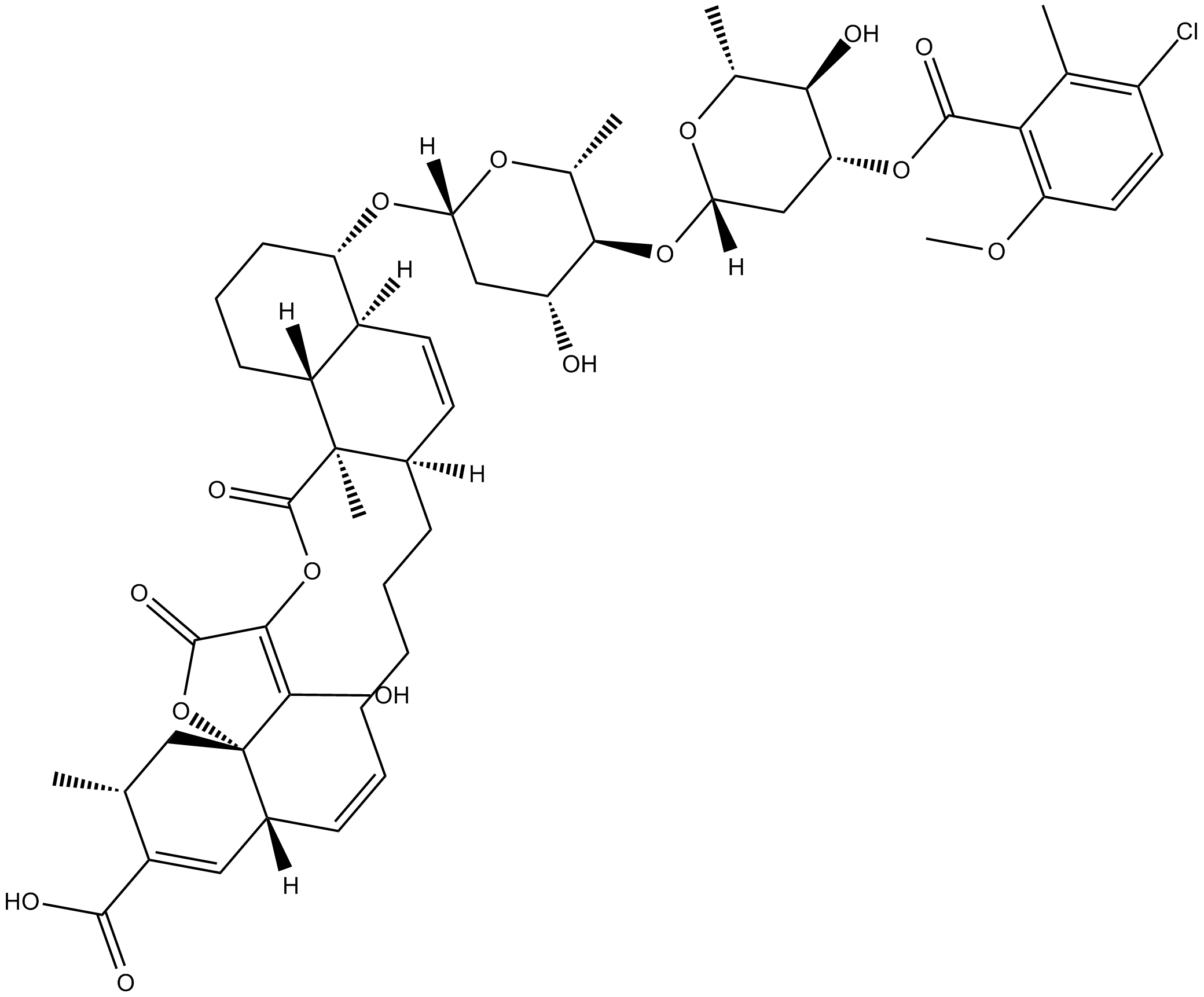
-
GC17165
Chloroxine
synthetic antibacterial compound
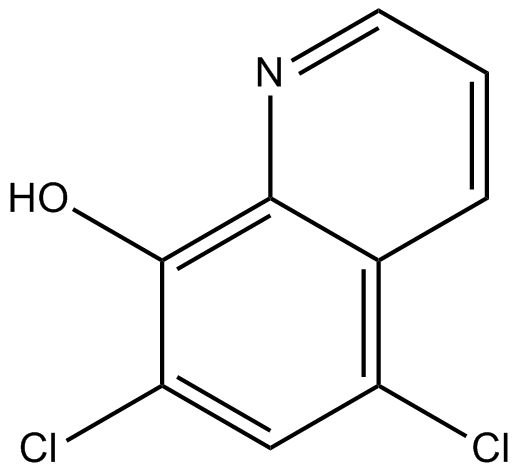
-
GC33937
Chloroxylenol (4-Chloro-3,5-dimethylphenol)
Chloroxylenol (4-Chloro-3,5-dimethylphenol) is a broad spectrum antimicrobial chemical compound used to control bacteria, algae, fungi and virus.
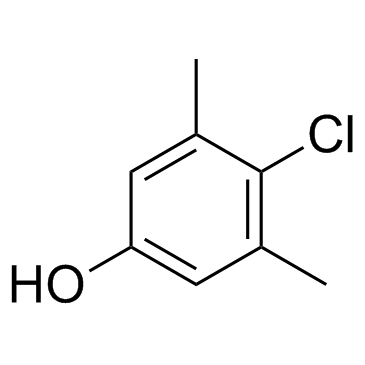
-
GC71694
Chloroxylenol-d6
Chloroxylenol-d6 is the deuterium labeled Chloroxylenol.

-
GC60701
Chlorphenesin
(±)-p-Chlorphenesin, NSC 6401
Chlorphenesin is a reversible antigen-associated immunosuppressant.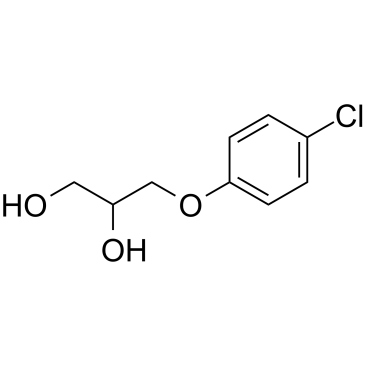
-
GC15312
Chlorprothixene
Dopamine receptor antagonist
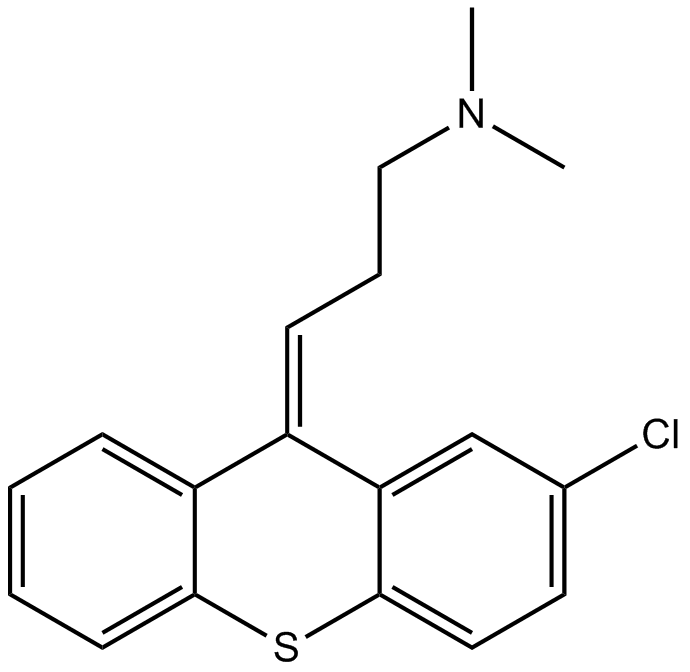
-
GC17540
Chlorquinaldol
Antifungal and antibacterial
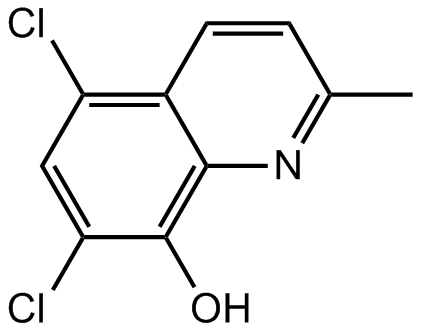
-
GC40996
Chlortetracycline
7-Chlortetracycline
Chlortetracycline is a broad-spectrum antibiotic originally isolated from S.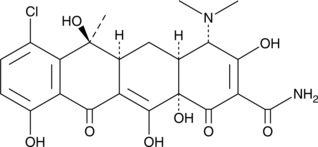
-
GC60702
Chlortetracycline hydrochloride
Chlortetracycline hydrochloride (7-Chlorotetracycline hydrochloride) is a specific and potent calcium ionophore antibiotic, inhibits binding of aminoacyl-tRNA to ribosomes.
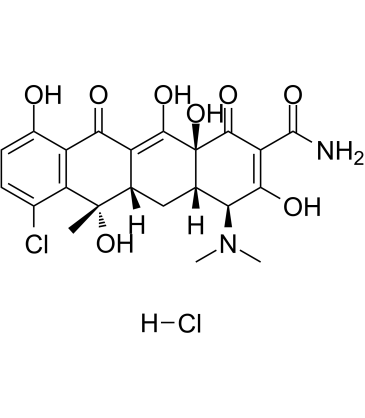
-
GC43259
Cholesteryl Homo-γ-Linolenate
20:3 (8Z,11Z,14Z) CE, 20:3 n-6 CE, 20:3 (8Z,11Z,14Z) Cholesterol Ester
Cholesteryl homo-γ-linolenate is a cholesterol ester.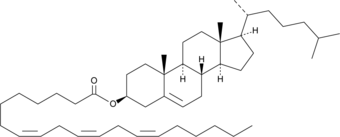
-
GC46119
Cholic Acid anilide
A synthetic bile acid
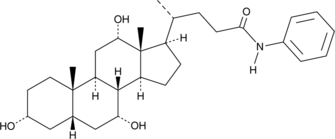
-
GC18344
Chrysomycin B
Albacarcin M, Virenomycin M
Chrysomycin B is an antibiotic isolated from a strain of Streptomyces.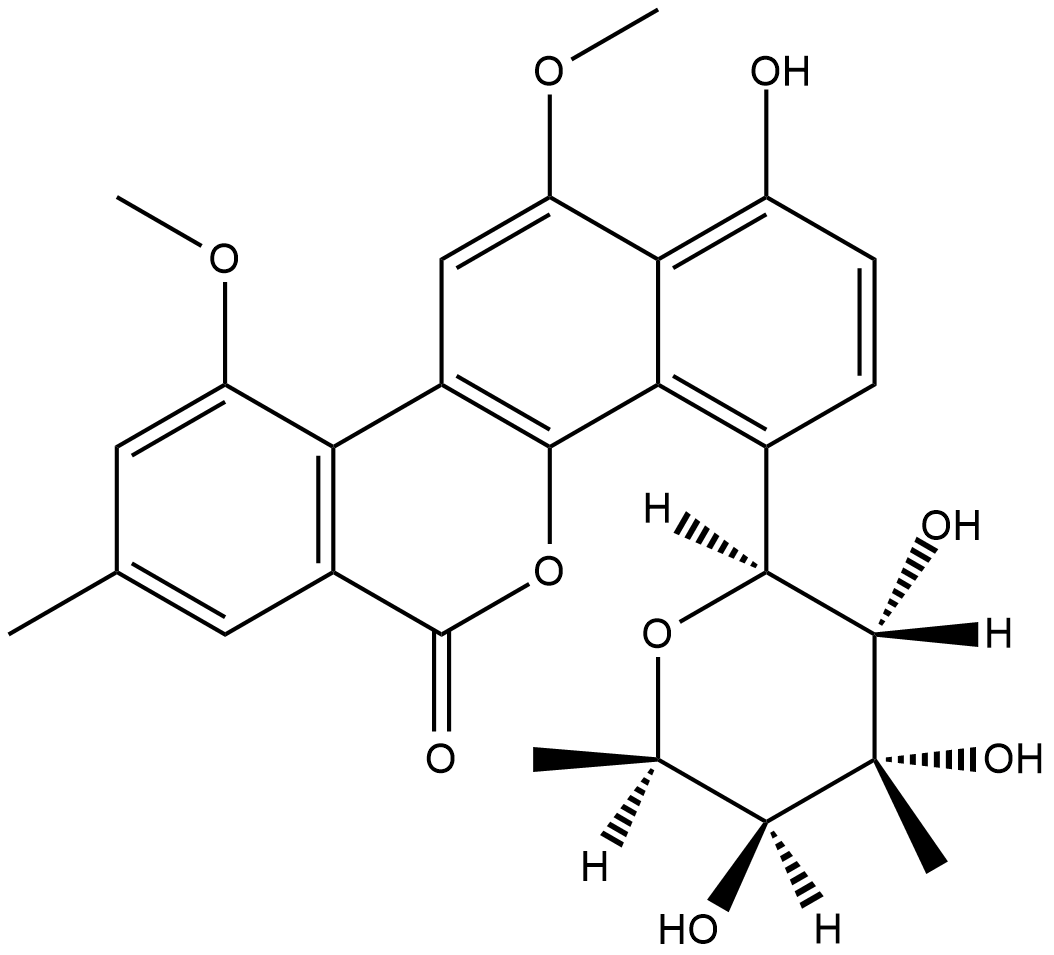
-
GC72052
Chrysophanol tetraglucoside
Chrysophanol tetraglucoside possesses anti-hypolipidemic and antibacterial activities.

-
GC64289
Cichoriin
Cichoriin is an active compounds against SARS-CoV-2, and may be a potential candidate in treating severe COVID-19.
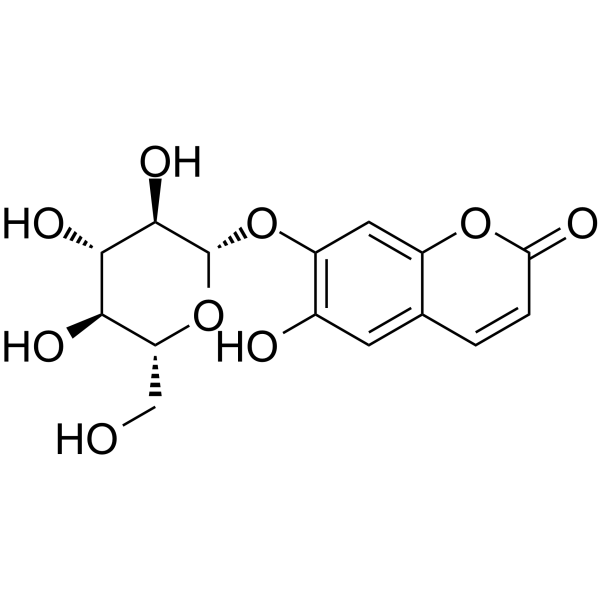
-
GC10132
Ciclopirox
HOE 296b
broad-spectrum antifungal agent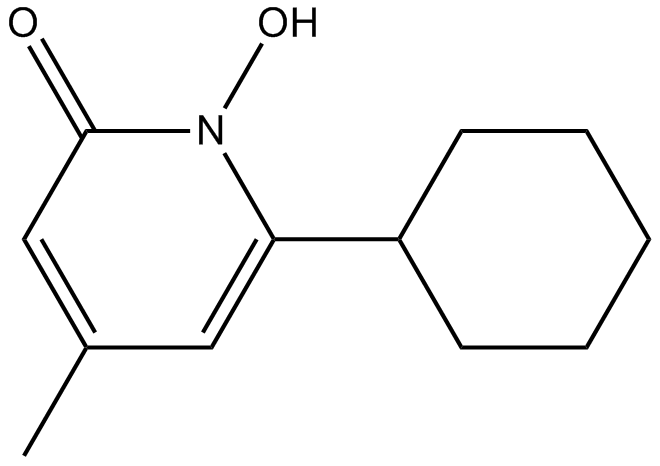
-
GC11120
Ciclopirox ethanolamine
Ciclopirox ethanolamine (Ciclopirox ethanolamine) is a synthetic antifungal agent that can be used for superficial mycoses reseaech.
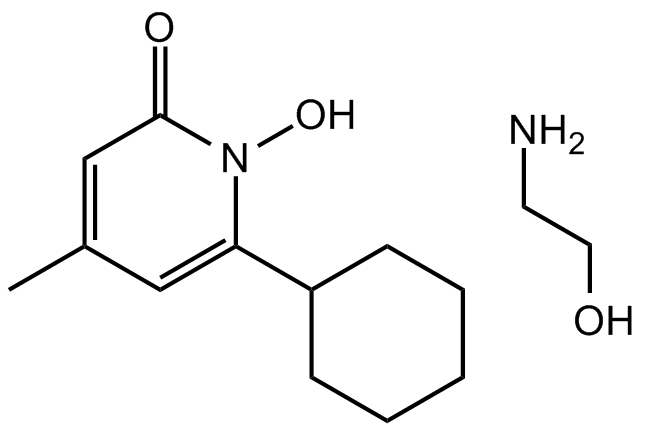
-
GC25249
CID-1517823
ML328
CID-1517823 (ML328) is a potent and selective inhibitor of bacterial AddAB and RecBCD helicase-nucleases, with IC50s of 1.0 and 4.8 μM.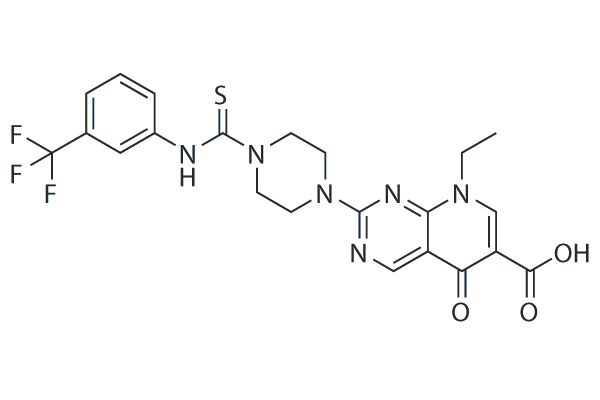
-
GC12666
Cidofovir
GS-0504, (S)-HPMPC, (S)-1-(3-hydroxy-2-phosphonylmethoxypropyl)cytosine
Anti-CMV drug;inhibitor of viral DNA syntheis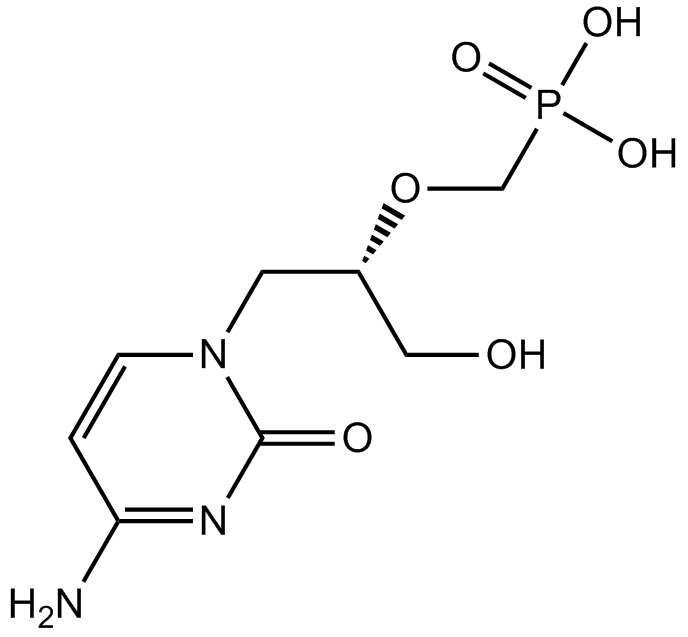
-
GC13936
Cidofovir dihydrate
Antiviral agent for CMV
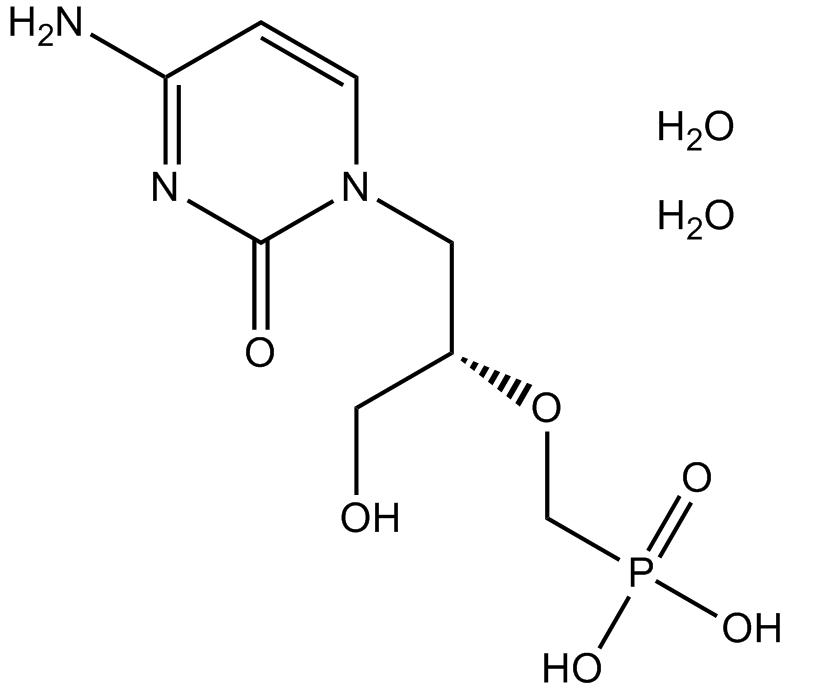
-
GC32162
Cilastatin (MK0791)
Cilastatin (MK0791) (MK0791) is a reversible, competitive renal dehydropeptidase I inhibitor with an IC50 of 0.1 μM.
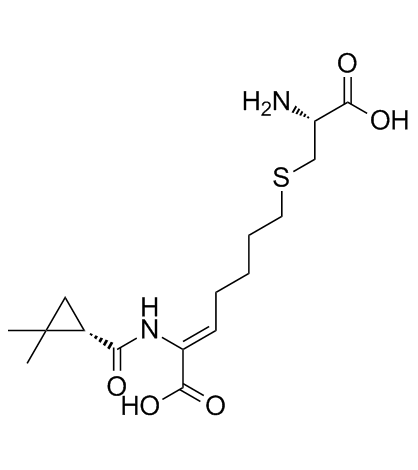
-
GC72412
Cilgavimab
Cilgavimab (AZD-1061; COV2-2130) is a human SARS-CoV-2-neutralizing monoclonal antibody, can compose monoclonal-antibody combination AZD7442 with Tixagevimab .

-
GC11840
Ciluprevir (BILN-2061)
BILN 2061; BILN 2061ZW
Inhibitor of HCV NS3 protease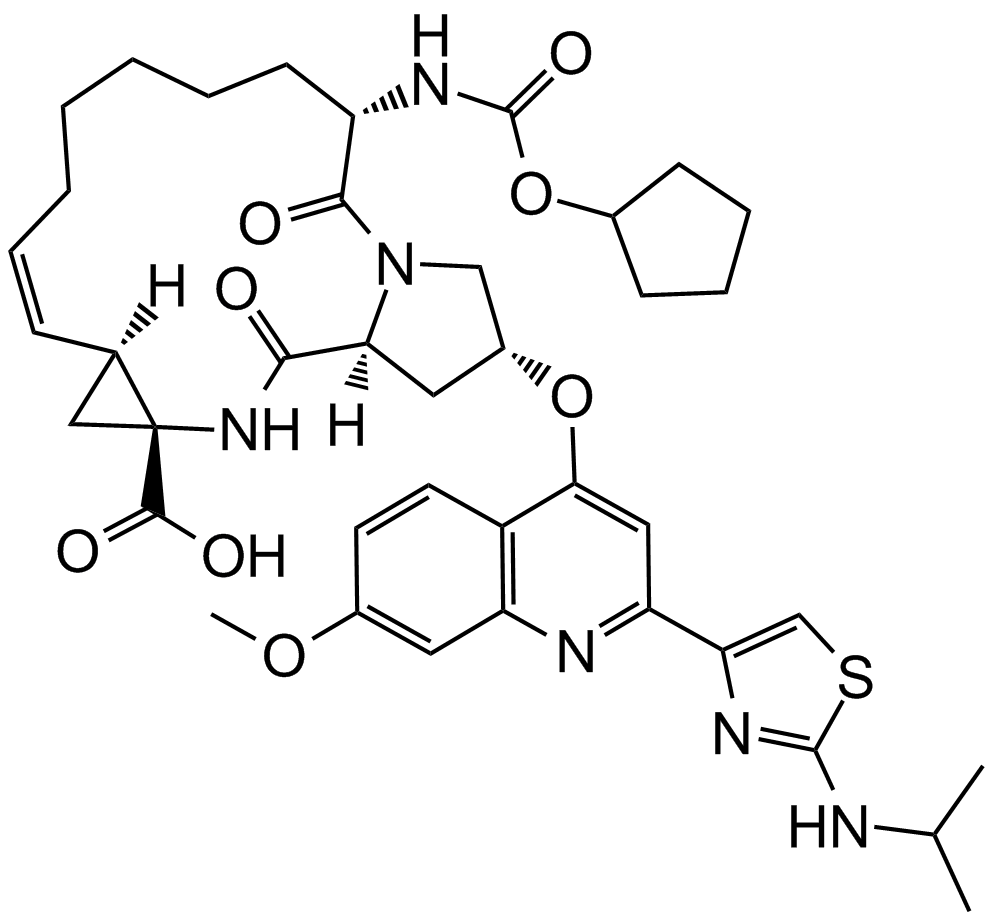
-
GC16135
Cinanserin hydrochloride
SQ 10,643
5-HT2 antagonist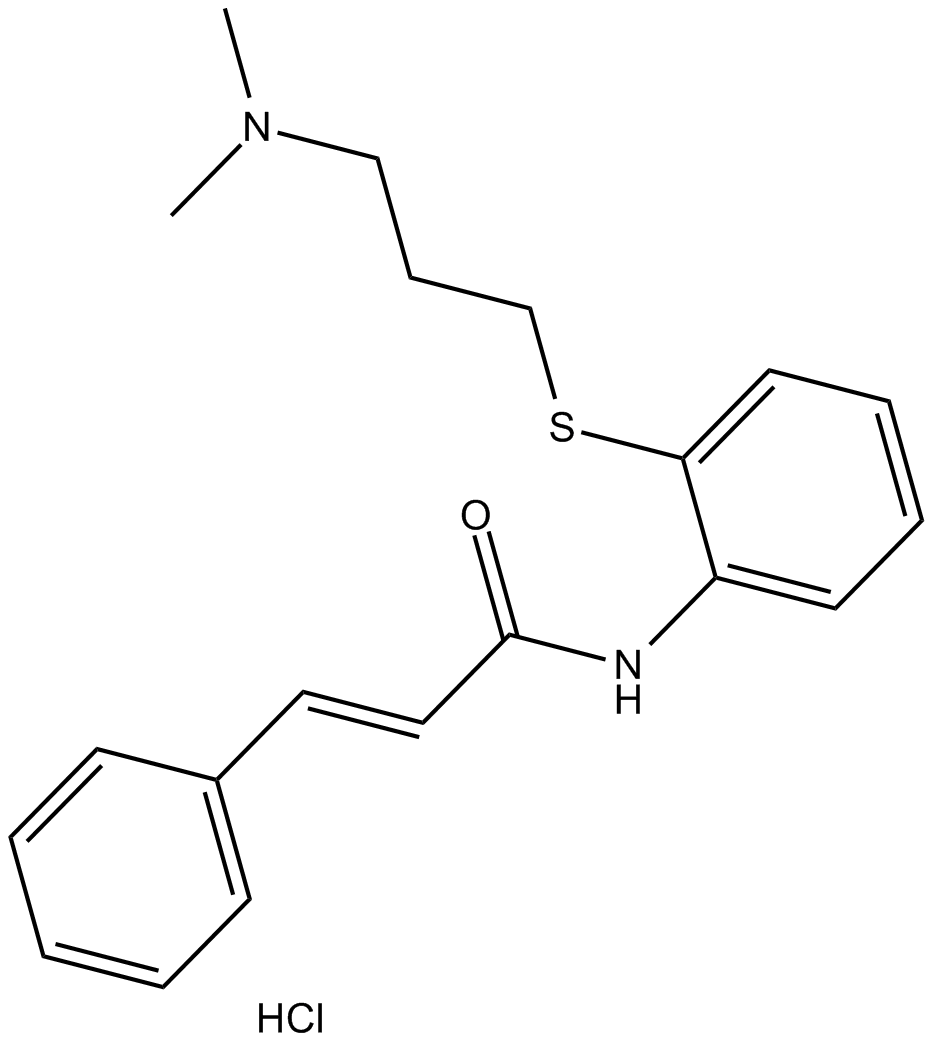
-
GC11798
Cinchonidine
alkaloid
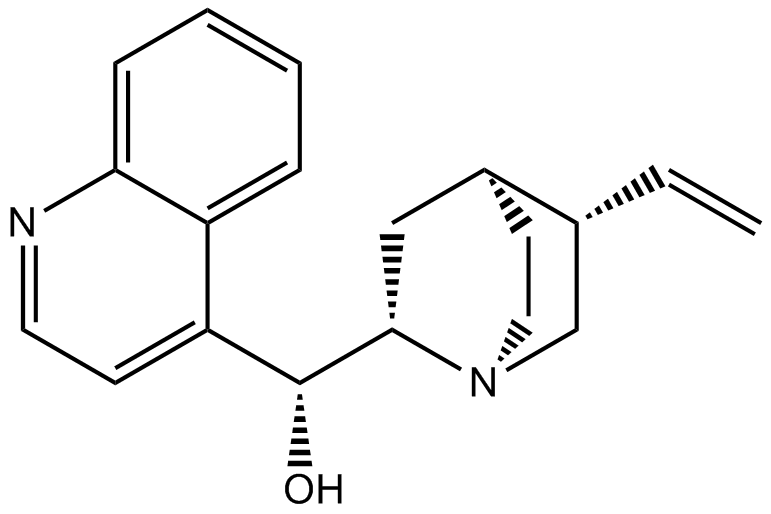
-
GC32997
Cinchonine ((8R,9S)-Cinchonine)
Cinchonine ((8R,9S)-Cinchonine) is a natural compound present in Cinchona bark. Cinchonine ((8R,9S)-Cinchonine) activates endoplasmic reticulum stress-induced apoptosis in human liver cancer cells.
